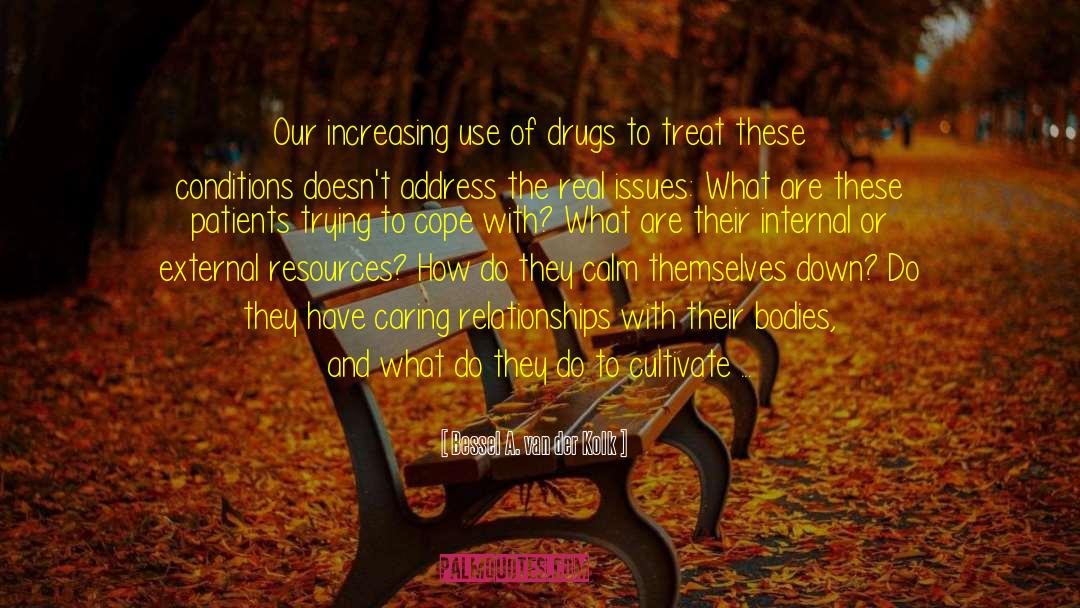Bessel A. Van Der Kolk Famous Quotes
Reading Bessel A. Van Der Kolk quotes, download and share images of famous quotes by Bessel A. Van Der Kolk. Righ click to see or save pictures of Bessel A. Van Der Kolk quotes that you can use as your wallpaper for free.
Children who don't feel safe in infancy have trouble regulating their moods and emotional responses as they grow older. By kindergarten, many disorganized infants are either aggressive or spaced out and disengaged, and they go on to develop a range of psychiatric problems.23 They also show more physiological stress, as expressed in heart rate, heart rate variability,24 stress hormone responses, and lowered immune factors.25 Does this kind of biological dysregulation automatically reset to normal as a child matures or is moved to a safe environment? So far as we know, it does not.
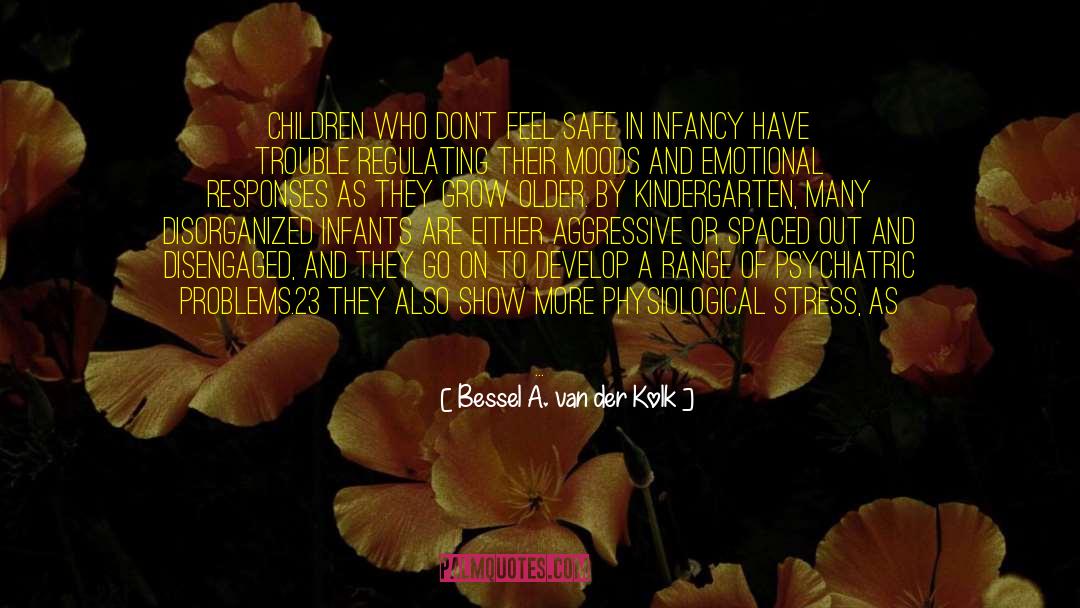
There can be no growth without curiosity and no adaptability without being able to explore, through trial and error, who you are and what matters to you.
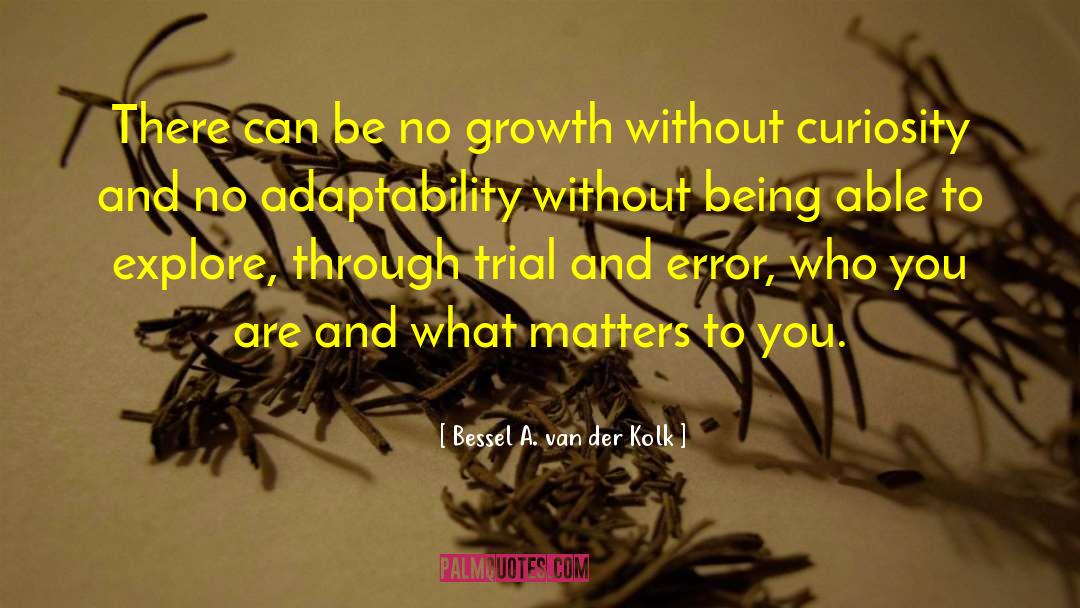
EMDR is a bizarre and wondrous treatment and anybody who first hears about it, myself included, thinks this is pretty hokey and strange. It's something invented by Francine Shapiro who found that, if you move your eyes from side to side as you think about distressing memories, that the memories lose their power.
And because of some experiences, both with myself, but even more with the patients of mine who told me about their experiences, I took a training in it. It turned out to be incredibly helpful. Then I did what's probably the largest NIH-funded study on EMDR. And we found that, of people with adult-onset traumas, a one-time trauma as an adult, that it had the best outcome of any treatment that has been published.
What's intriguing about EMDR is both how well it works and the question is how it works and that got me into this dream stuff that I talked about earlier, and how it does not work through figuring things out and understanding things. But it activates some natural processes in the brain that's helped you to integrate these past memories.
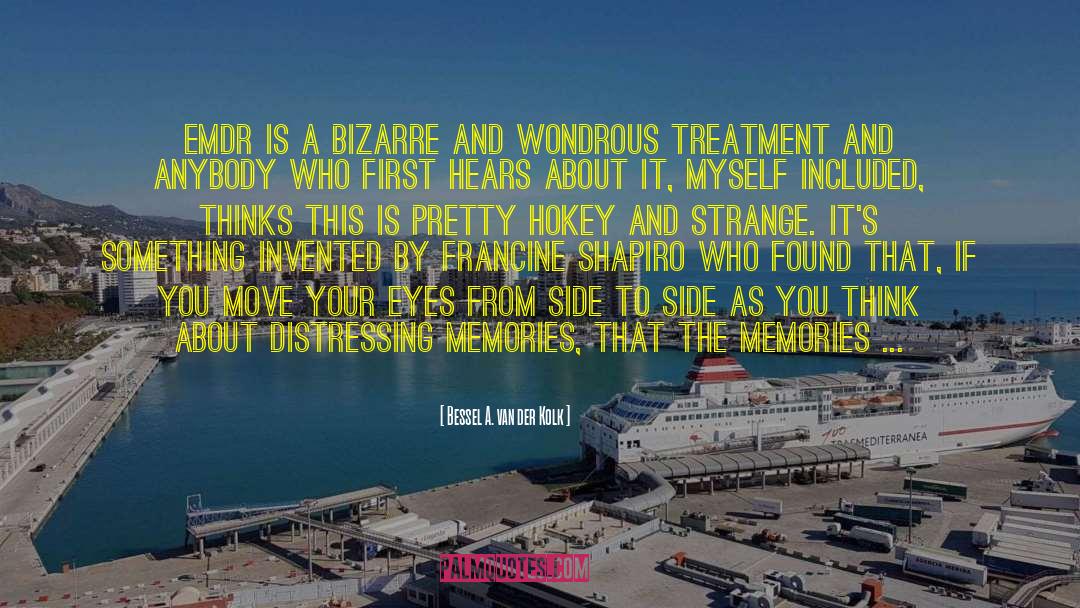
In a series of elegant studies Stickgold and his colleagues showed that the sleeping brain can even make sense out of information whose relevance is unclear while we are awake and integrate it into the larger memory system.13
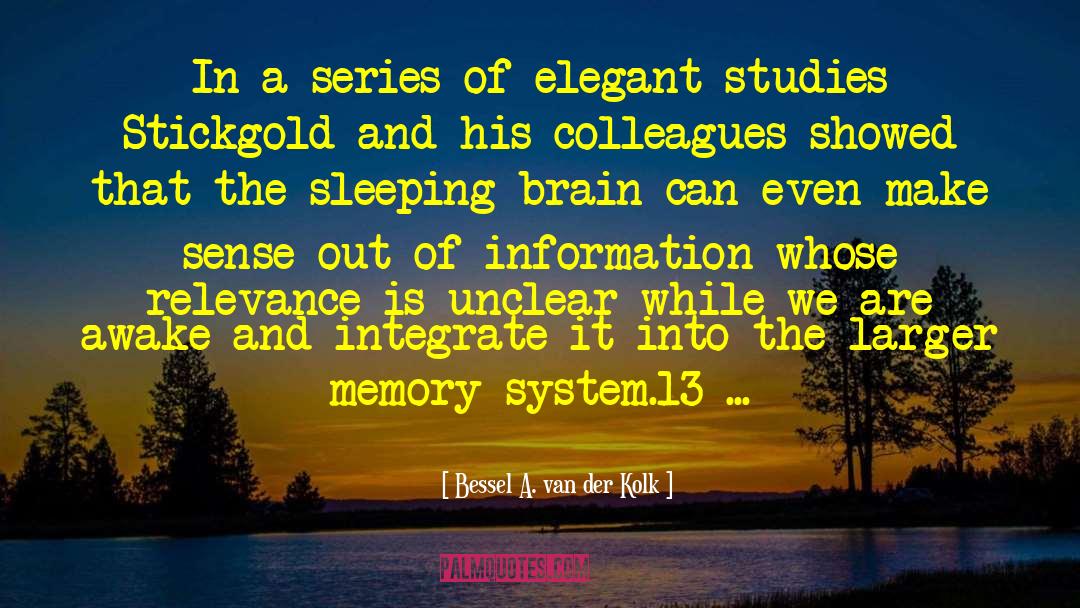
Managing your terror all by yourself gives rise to another set of problems: dissociation, despair, addictions, a chronic sense of panic, and relationships that are marked by alienation, disconnections, and explosions. Patients with these histories rarely make the connection between what has happened to them a long time ago and how they currently feel and behave. Everything just seems unmanageable.

Healing, he told us, depends on experiential knowledge: You can be fully in charge of your life only if you can acknowledge the reality of your body, in all its visceral dimensions.
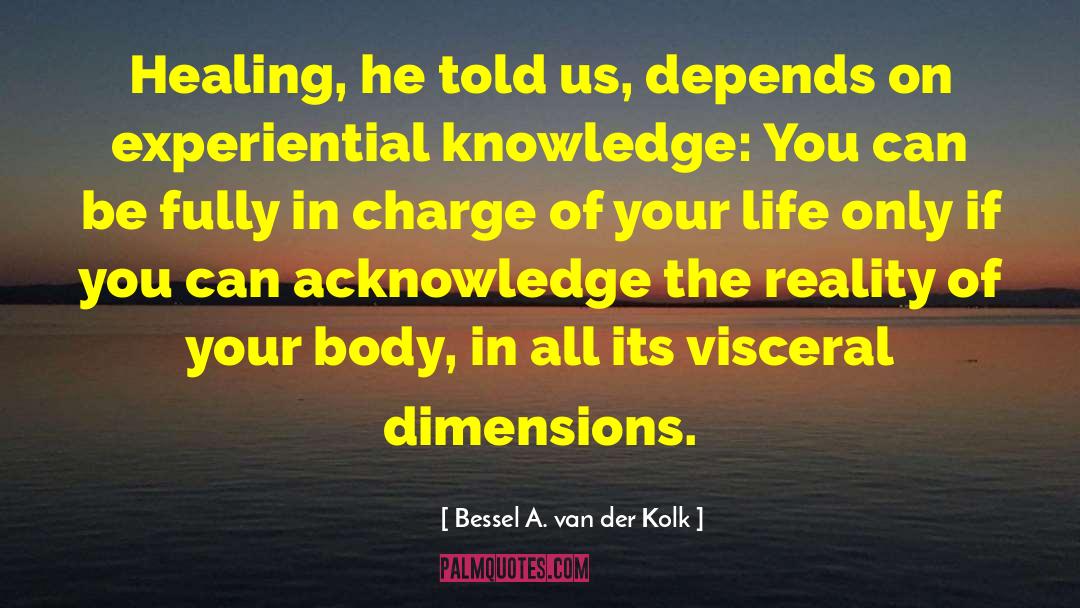
In our studies we keep seeing how difficult it is for traumatized people to feel completely relaxed and physically safe in their bodies. We measure our subjects' HRV by placing tiny monitors on their arms during shavasana, the pose at the end of most classes during which practitioners lie face up, palms up, arms and legs relaxed. Instead of relaxation we picked up too much muscle activity to get a clear signal. Rather than going into a state of quiet repose, our students' muscles often continue to prepare them to fight unseen enemies. A major challenge in recovering from trauma remains being able to achieve a state of total relaxation and safe surrender.
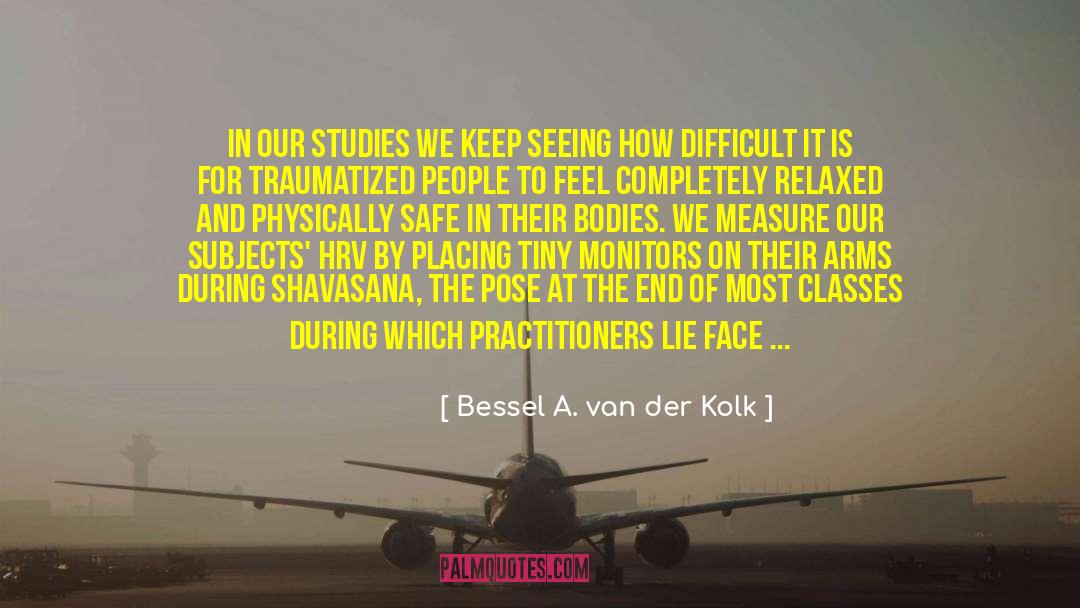
The more you stay focused on your breathing, the more you will benefit, particularly if you pay attention until the very end of the out breath and then wait a moment before you inhale again. As you continue to breathe and notice the air moving in and out of your lungs you may think about the role that oxygen plays in nourishing your body and bathing your tissues with the energy you need to feel alive and engaged.
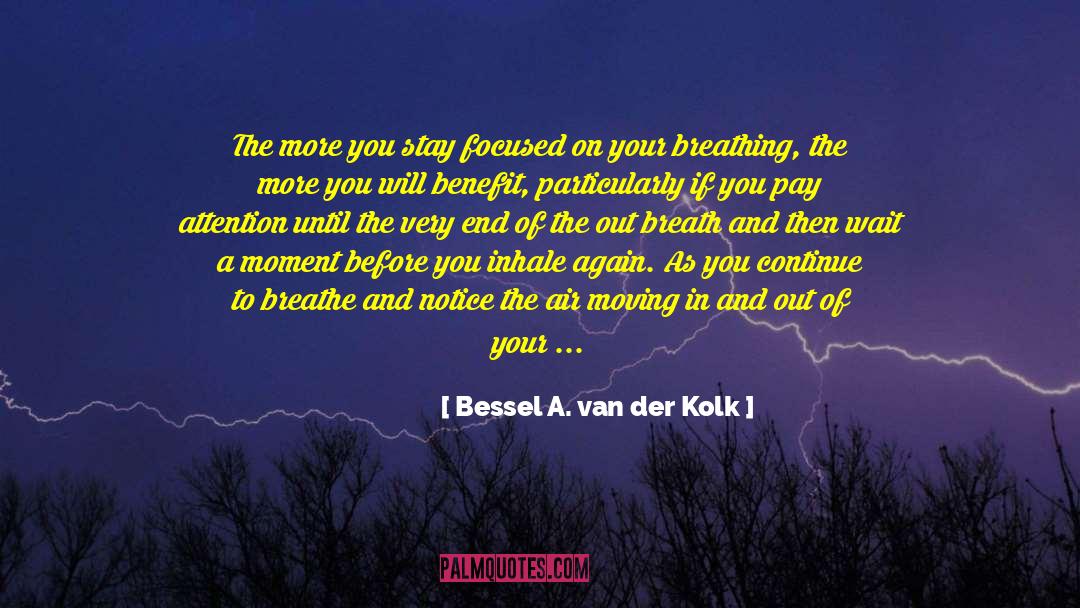
Emotion is not opposed to reason; our emotions assign value to experiences and thus are the foundation of reason.
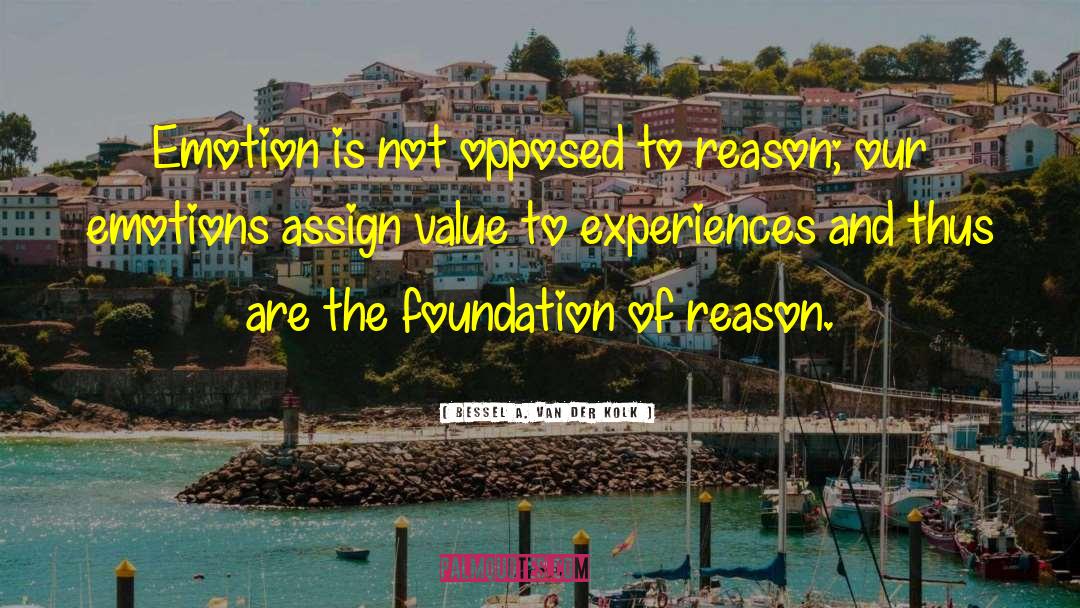
research has shown that depressed patients without prior histories of abuse or neglect tend to respond much better to antidepressants than patients with those backgrounds.17)

Economists have calculated that every dollar invested in high-quality home visitation, day care, and preschool programs results in seven dollars of savings on welfare payments, health-care costs, substance-abuse treatment, and incarceration, plus higher tax revenues due to better-paying jobs.37

The brain-disease model overlooks four fundamental truths: (1) our capacity to destroy one another is matched by our capacity to heal one another. Restoring relationships and community is central to restoring well-being; (2) language gives us the power to change ourselves and others by communicating our experiences, helping us to define what we know, and finding a common sense of meaning; (3) we have the ability to regulate our own physiology, including some of the so-called involuntary functions of the body and brain, through such basic activities as breathing, moving, and touching; and (4) we can change social conditions to create environments in which children and adults can feel safe and where they can thrive.
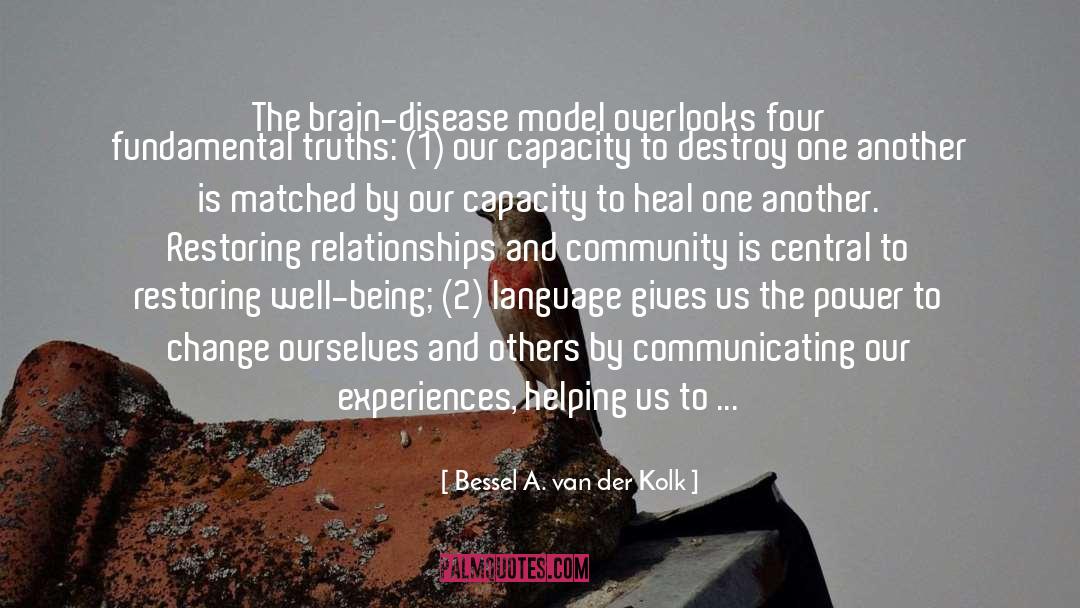
In the culture people talk about trauma as an event that happened a long time ago. But what trauma is, is the imprints that event has left on your mind and in your sensations... the discomfort you feel and the agitation you feel and the rage and the helplessness you feel right now.

The internal system of an abuse victim differs from the non-abuse system with regard to the consistent absence of the effective leadership, the extreme rules under which the parts function, and the absenve of any consistent balance or harmony. Typically, the parts operate around outdated assumptions and beliefs derived from the childhood abuse, believing, for example, that it is still extremely dangerous to reveal secrets about childhood experiences which were endured.
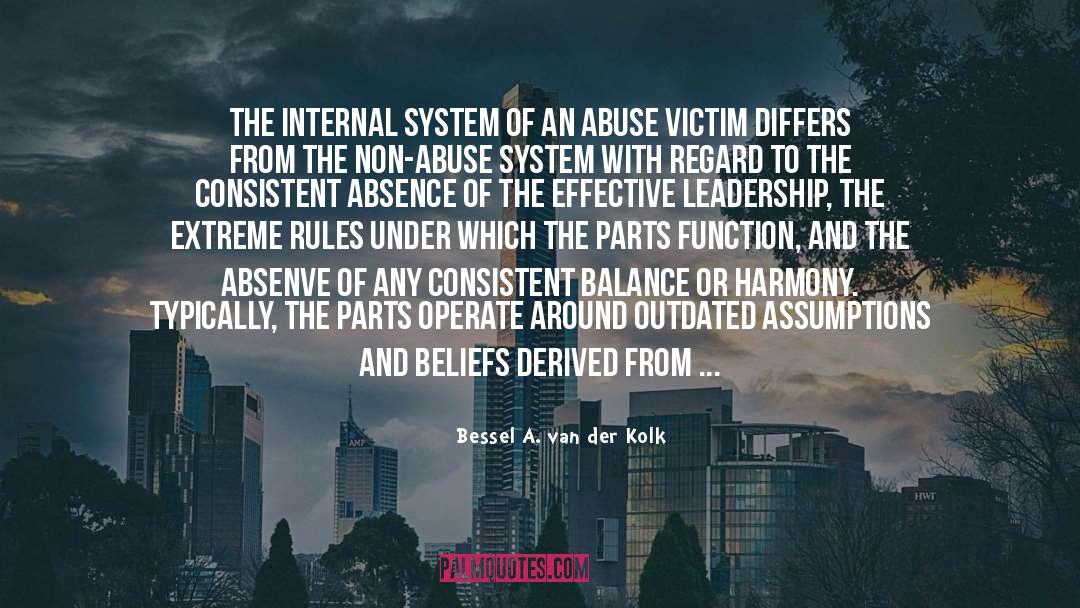
If you're still in it, it's hard to talk about it. I wasn't able to attach in the way that you need to attach and open up in the way that you need to open up in order to have any type of relationship with a therapist." This was a stunning revelation: So many patients are in and out of treatment, unable to meaningfully connect because they are still "in it." Of course, when people don't know who they are, they can't possibly see the reality of the people around them.
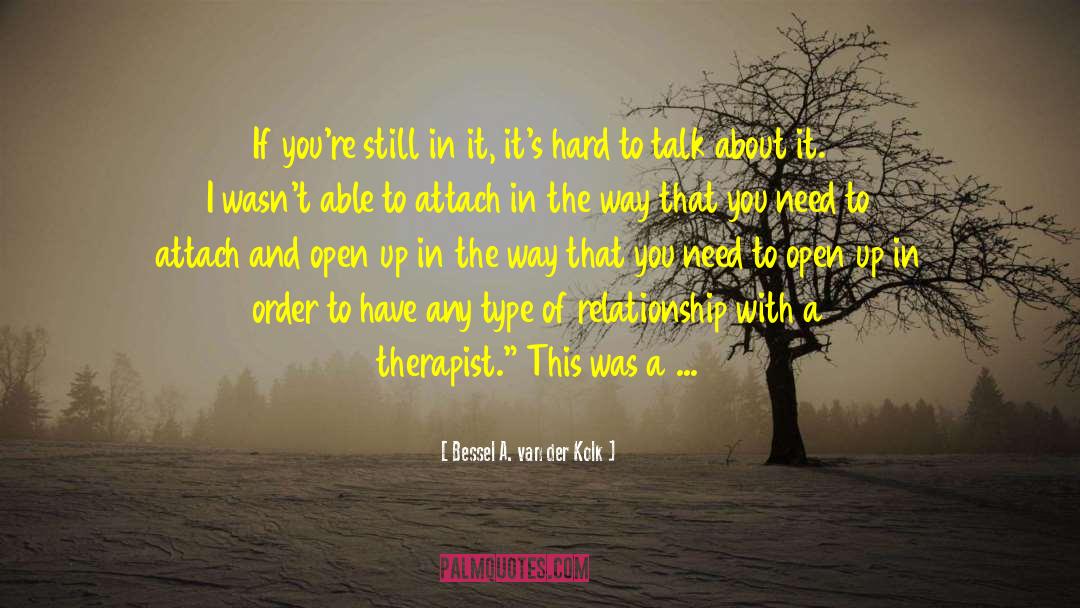
How did his brain come to derive comfort from fishing rather than from compulsive sexual behavior? At this point we simply don't know. Neurofeedback changes brain connectivity patterns; the mind follows by creating new patterns of engagement.
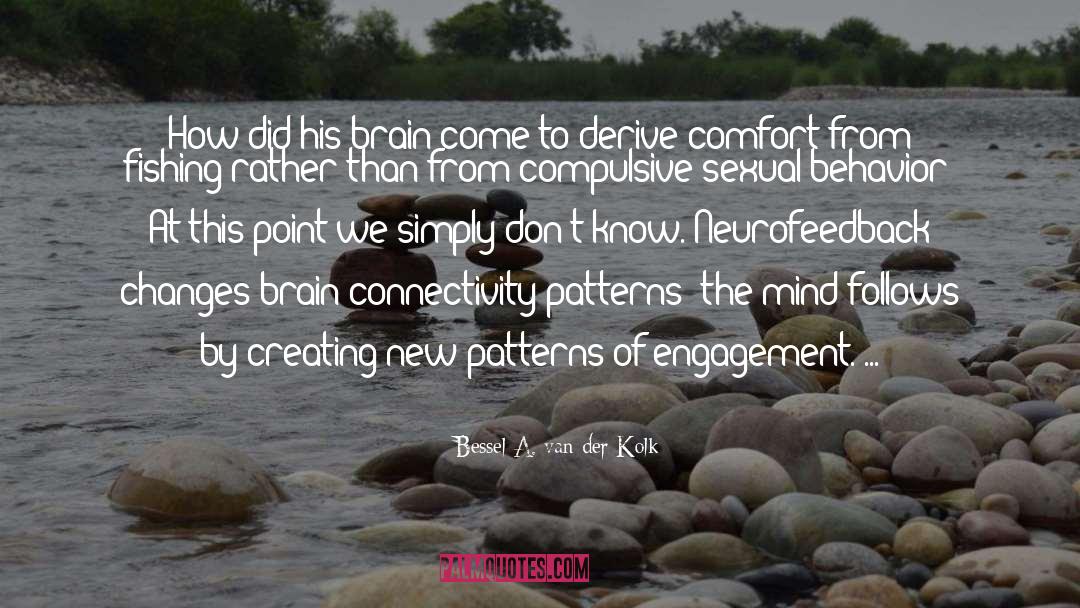
During disasters young children usually take their cues from their parents. As long as their caregivers remain calm and responsive to their needs, they often survive terrible incidents without serious psychological scars.
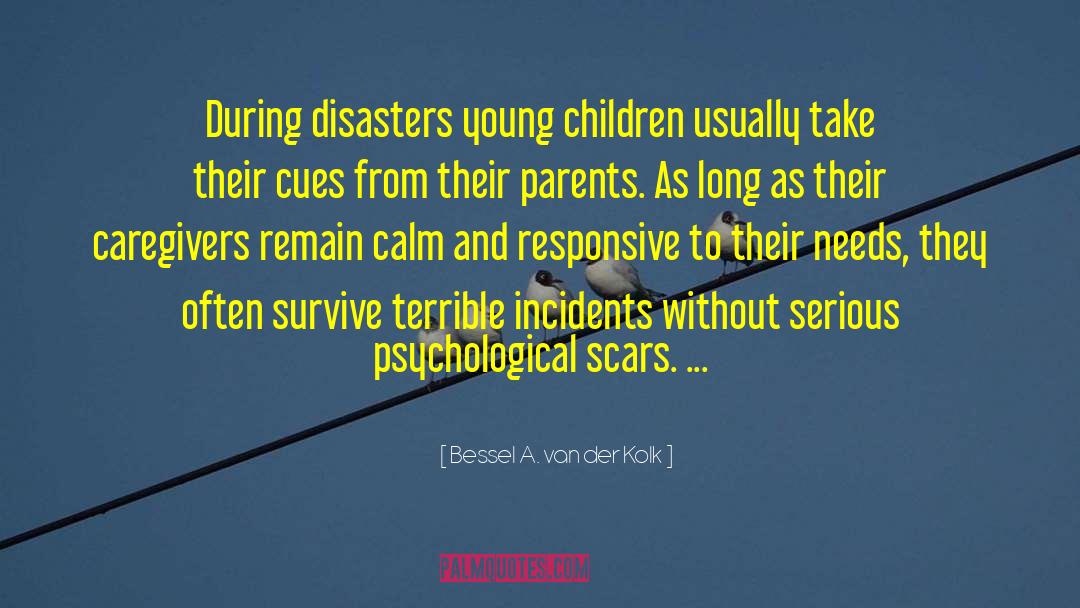
Mary was my first encounter with dissociative identity disorder (DID), which at that time was called multiple personality disorder. As dramatic as its symptoms are, the internal splitting and emergence of distinct identities experienced in DID represent only the extreme end of the spectrum of mental life.
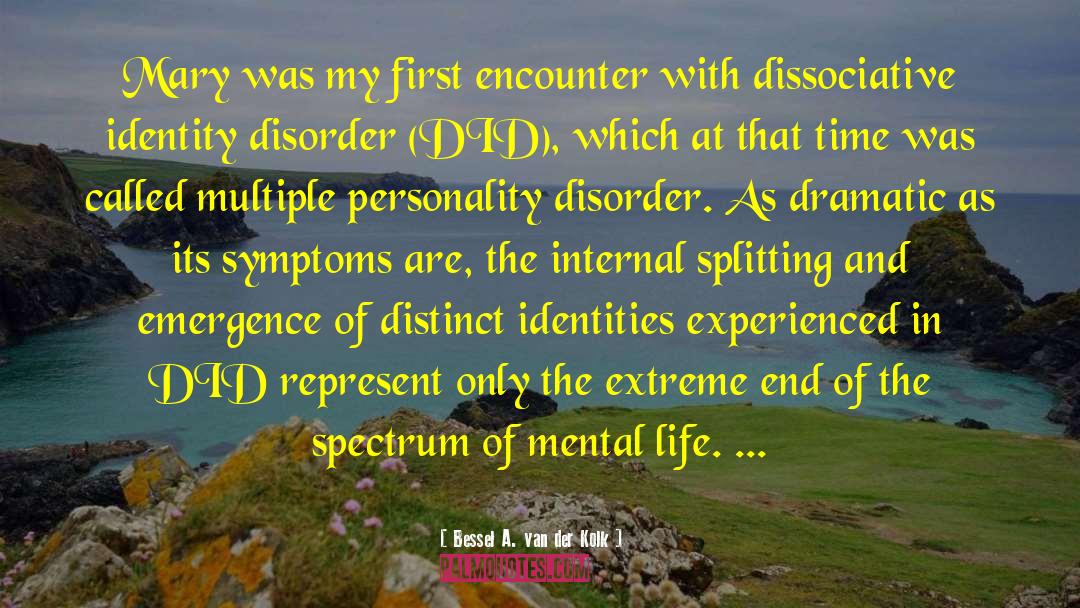
If your parents' faces never lit up when they looked at you, it's hard to know what it feels like to be loved and cherished. If you come from an incomprehensible world filled with secrecy and fear, it's almost impossible to find the words to express what you have endured. If you grew up unwanted and ignored, it is a major challenge to develop a visceral sense of agency and self-worth.
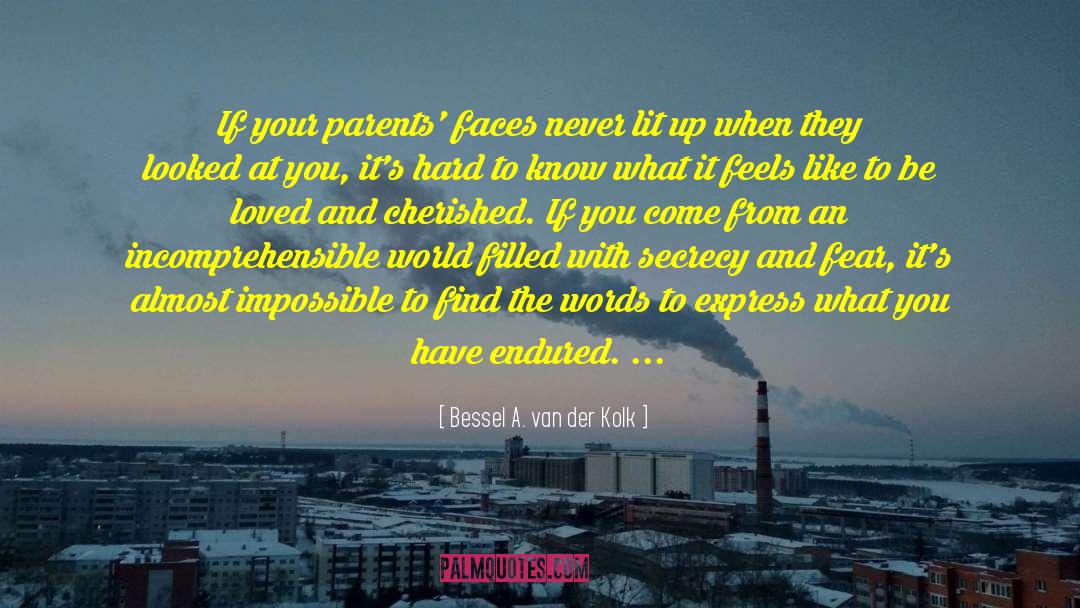
One day he told me that he'd spent his adulthood trying to let go of his past, and he remarked how ironic it was that he had to get closer to it in order to let it go.

Whatever happens to a baby contributes to the emotional and perceptual map of the world that its developing brain creates. As my colleague Bruce Perry explains it, the brain is formed in a "use-dependent manner."5 This is another way of describing neuroplasticity, the relatively recent discovery that neurons that "fire together, wire together." When a circuit fires repeatedly, it can become a default setting - the response most likely to occur. If you feel safe and loved, your brain becomes specialized in exploration, play, and cooperation; if you are frightened and unwanted, it specializes in managing feelings of fear and abandonment. As infants and
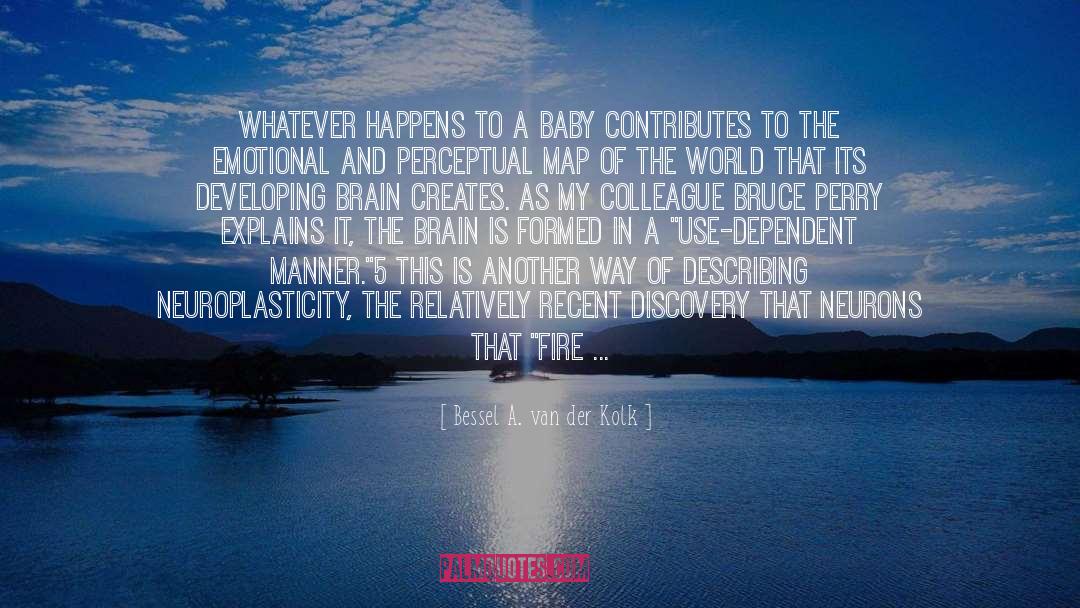
However, traumatized people chronically feel unsafe inside their bodies: The past is alive in the form of gnawing interior discomfort. Their bodies are constantly bombarded by visceral warning signs, and, in an attempt to control these processes, they often become expert at ignoring their gut feelings and in numbing awareness of what is played out inside. They learn to hide from their selves.
The more people try to push away and ignore internal warning signs, the more likely they are to take over and leave them bewildered, confused, and ashamed. People who cannot comfortably notice what is going on inside become vulnerable to respond to any sensory shift either by shutting down or by going into a panic - they develop a fear of fear itself.

The elementary self system in the brain stem and limbic system is massively activated when people are faced with the threat of annihilation, which results in an overwhelming sense of fear and terror accompanied by intense physiological arousal. To people who are reliving a trauma, nothing makes sense; they are trapped in a life-or-death situation, a state of paralyzing fear or blind rage. Mind and body are constantly aroused, as if they are in imminent danger.
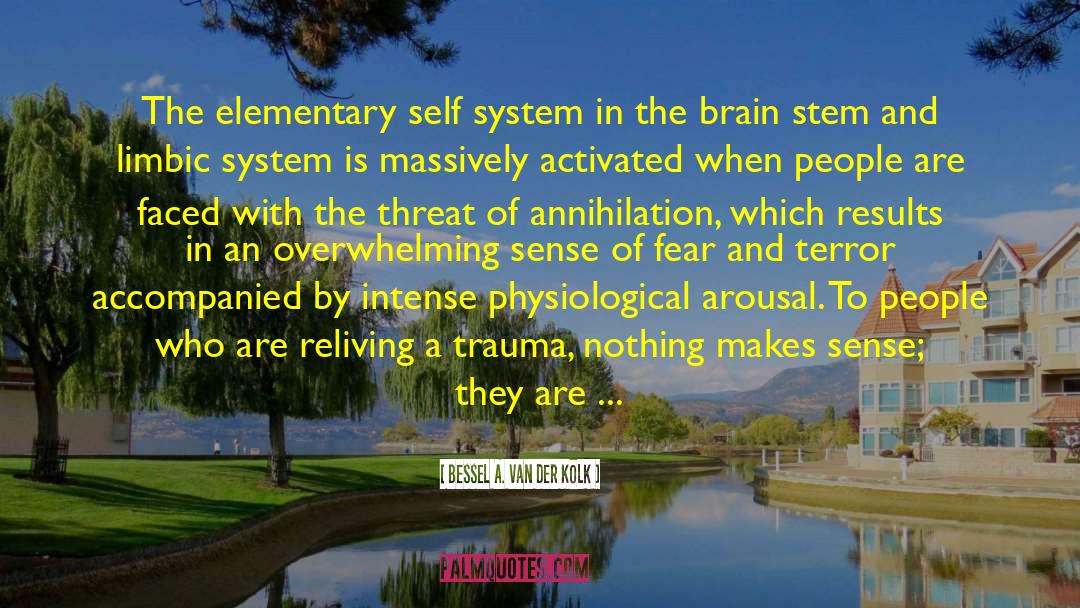
Despite the well-documented effects of anger, fear, and anxiety on the ability to reason, many programs continue to ignore the need to engage the safety system of the brain before trying to promote new ways of thinking. The last things that should be cut from school schedules are chorus, physical education, recess, and anything else involving movement, play, and joyful engagement. When children are oppositional, defensive, numbed out, or enraged, it's also important to recognize that such "bad behavior" may repeat action patterns that were established to survive serious threats, even if they are intensely upsetting or off-putting.
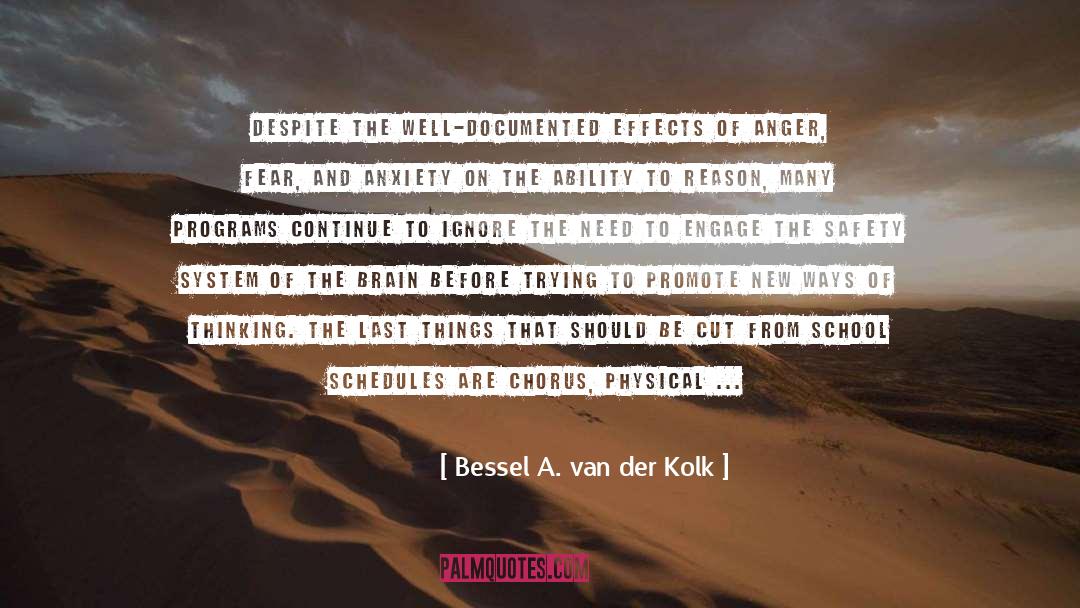
The scientific study of the vital relationship between infants and their mothers was started by upper-class Englishmen who were torn from their families as young boys to be sent off to boarding schools, where they were raised in regimented same-sex settings.

Rage that has nowhere to go is redirected against the self, in the form of depression, self-hatred, and self-destructive actions. One of my patients told me, 'It is like hating your home, your kitchen and pots and pans, your bed, your chairs, your table, your rugs.' Nothing feels safe – least of all your own body.
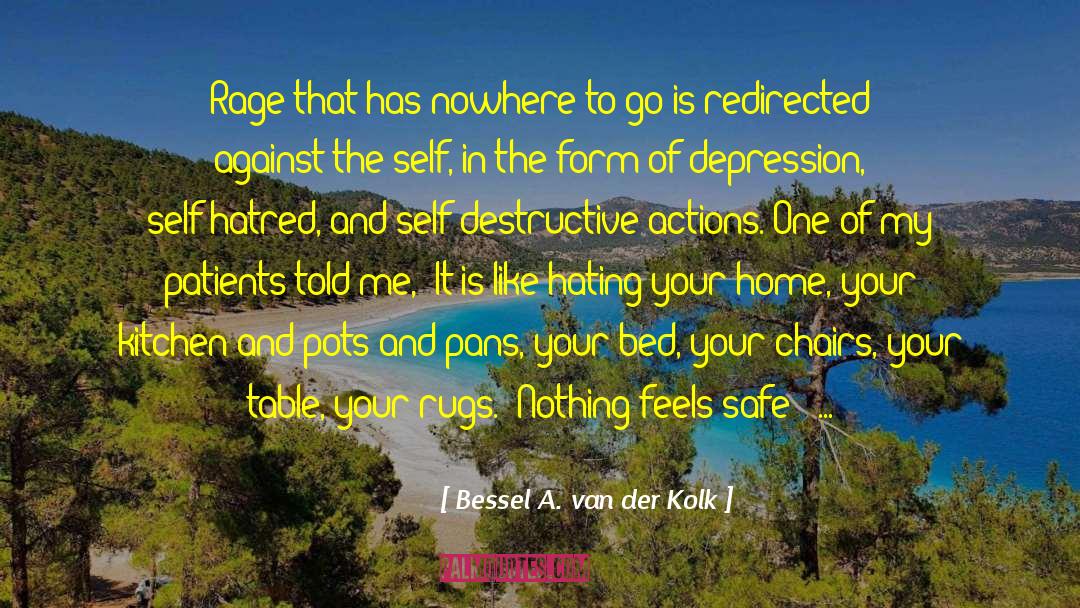
the job of the brain is to constantly monitor and evaluate what is going on within and around us. These evaluations are transmitted by chemical messages in the bloodstream and electrical messages in our nerves, causing subtle or dramatic changes throughout the body and brain. These shifts usually occur entirely without conscious input or awareness: The subcortical regions of the brain are astoundingly efficient in regulating our breathing, heartbeat, digestion, hormone secretion, and immune system. However, these systems can become overwhelmed if we are challenged by an ongoing threat, or even the perception of threat. This accounts for the wide array of physical problems researchers have documented in traumatized people. Yet our conscious self also plays a vital role in maintaining our inner equilibrium: We need to register and act on our physical sensations to keep our bodies safe.
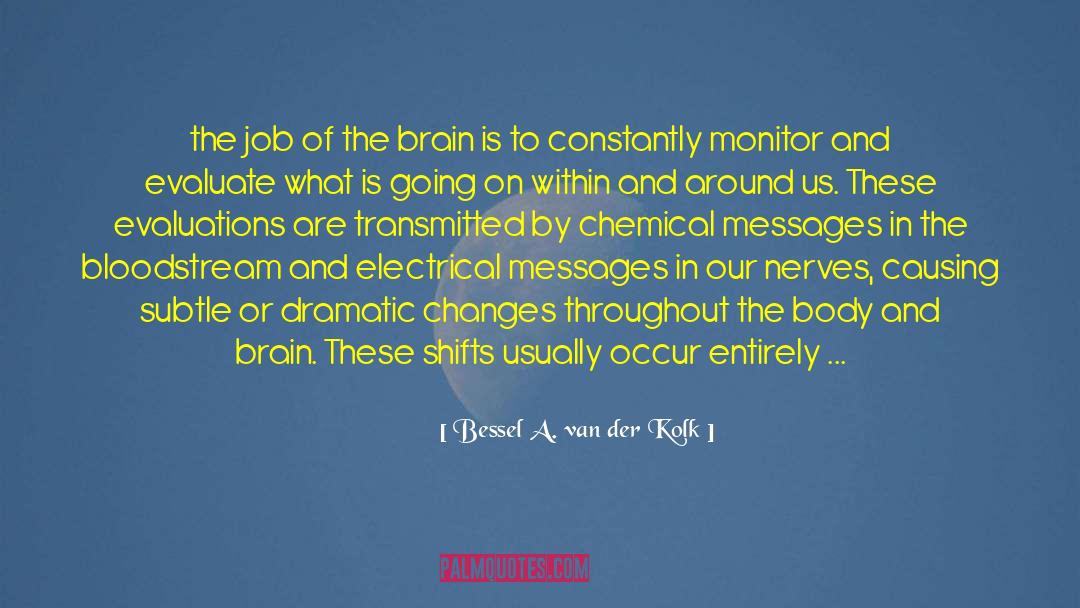
It was early in my career, and I had been seeing Mary, a shy, lonely, and physically collapsed young woman, for about three months in weekly psychotherapy, dealing with the ravages of her terrible history of early abuse. One day I opened the door to my waiting room and saw her standing there provocatively, dressed in a miniskirt, her hair dyed flaming red, with a cup of coffee in one hand and a snarl on her face. "You must be Dr. van der Kolk," she said. "My name is Jane, and I came to warn you not to believe any the lies that Mary has been telling you. Can I come in and tell you about her?" I was stunned but fortunately kept myself from confronting "Jane" and instead heard her out. Over the course of our session I met not only Jane but also a hurt little girl and an angry male adolescent. That was the beginning of a long and productive treatment.

When words fail, haunting images capture the experience and return as nightmares and flashbacks. In contrast to the deactivation of Broca's area, another region, Brodmann's area 19, lit up in our participants. This is a region in the visual cortex that registers images when they first enter the brain. We were surprised to see brain activation in this area so long after the original experience of the trauma. Under ordinary conditions raw images registered in area 19 are rapidly diffused to other brain areas that interpret the meaning of what has been seen. Once again, we were witnessing a brain region rekindled as if the trauma were actually occurring.
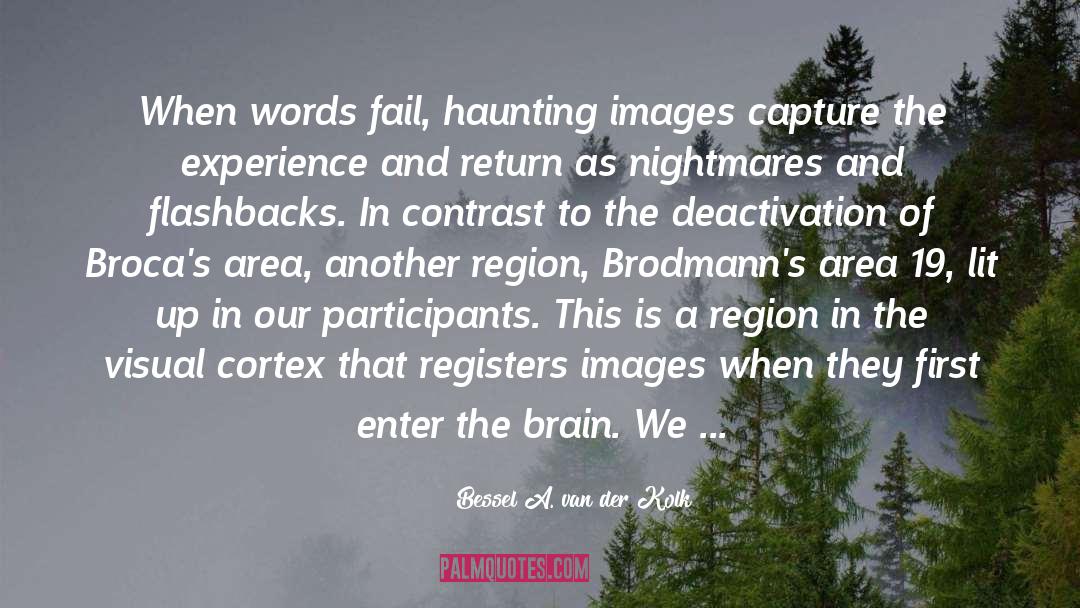
refers to the many branches of the vagus nerve - Darwin's "pneumogastric nerve" - which connects numerous organs, including the brain, lungs, heart, stomach, and intestines.) The Polyvagal Theory provided us with a more sophisticated understanding of the biology of safety and danger, one based on the subtle interplay between the visceral experiences of our own bodies and the voices and faces of the people around us. It explained why a kind face or a soothing tone of voice can dramatically alter the way we feel. It clarified why knowing that we are seen and heard by the important people in our lives can make us feel calm and safe, and why being ignored or dismissed can precipitate rage reactions or mental collapse. It helped us understand why focused attunement with another person can shift us out of disorganized and fearful states.
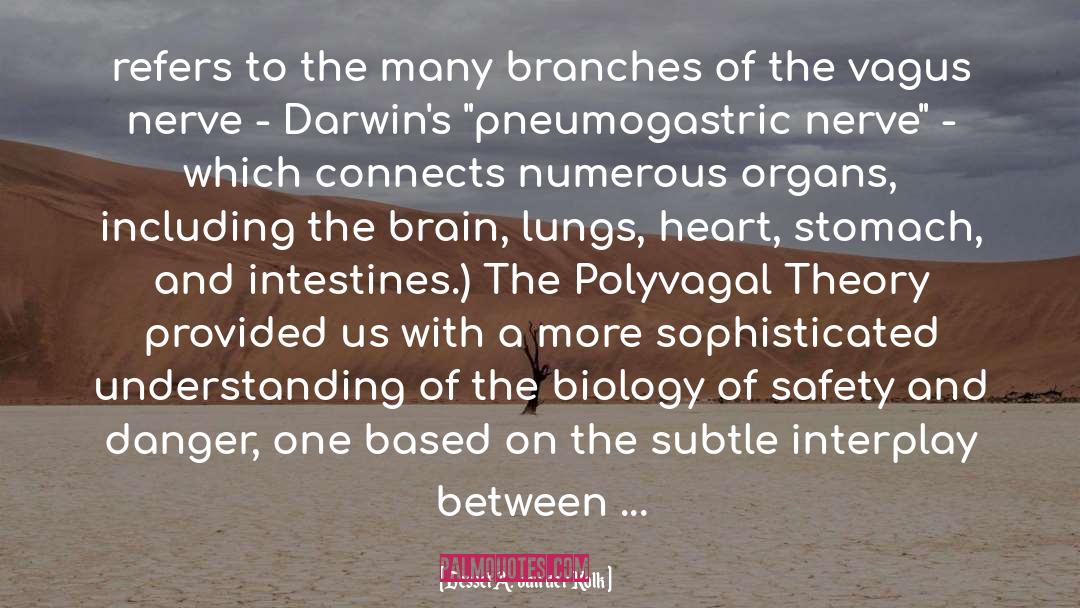
Beneath the surface of the protective parts of trauma survivors there exists an undamaged essence, a Self that is confident, curious, and calm, a Self that has been sheltered from destruction by the various protectors that have emerged in their efforts to ensure survival. Once those protectors trust that it is safe to separate, the Self will spontaneously emerge, and the parts can be enlisted in the healing process
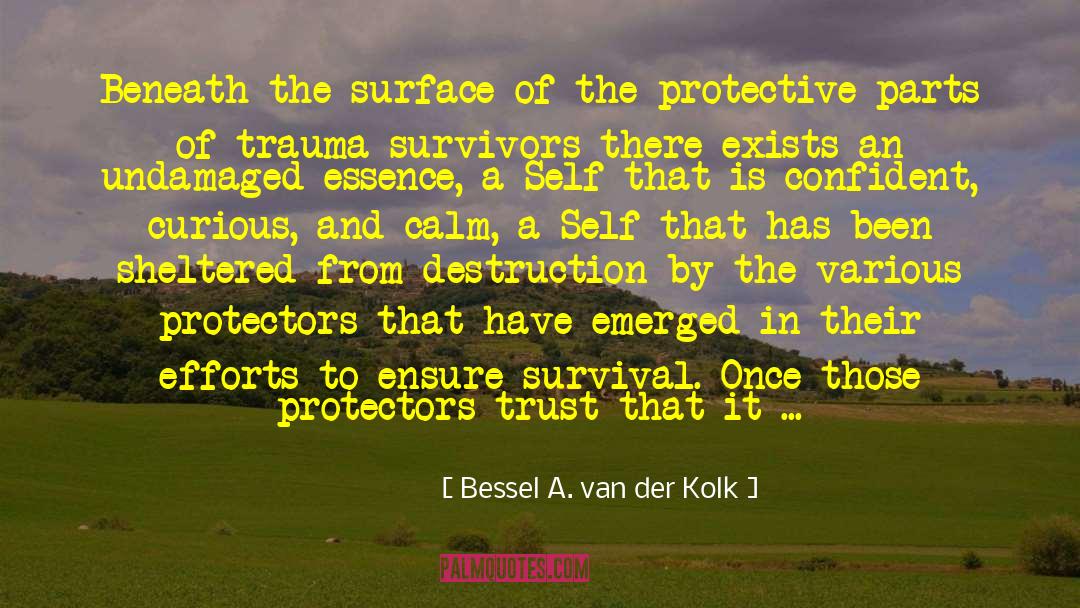
One tragic example of this orientation is the rampant prescription of painkillers, which now kill more people each year in the United States than guns or car accidents.
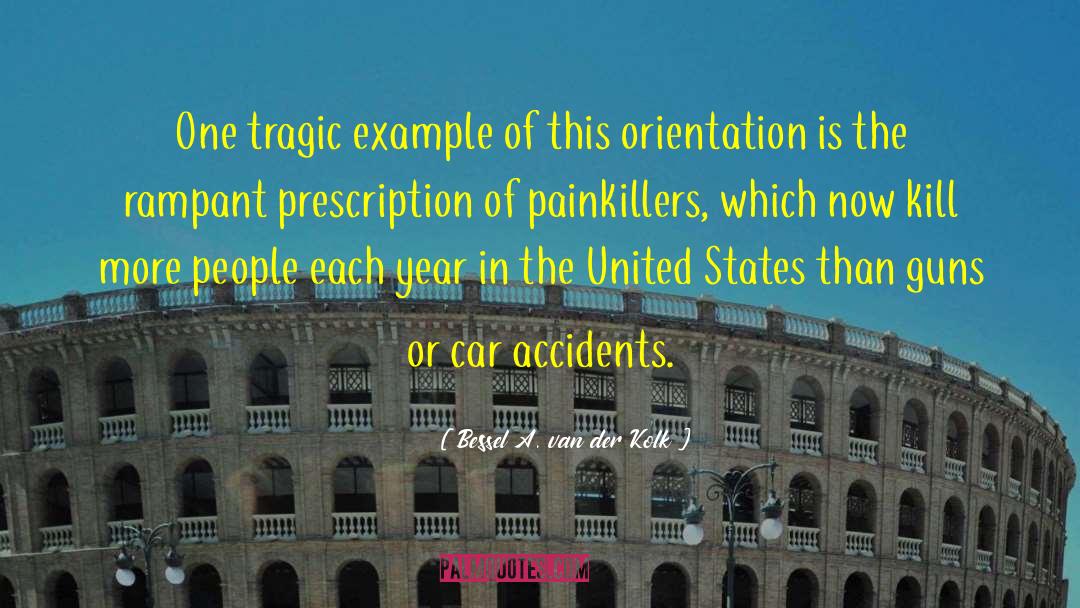
Since then the field of neurofeedback has grown by fits and starts, with much of the scientific groundwork being done in Europe, Russia, and Australia. Even though there are about ten thousand neurofeedback practitioners in the United States, the practice has not been able to garner the research funding necessary to gain widespread acceptance. One reason may be that there are multiple competing neurofeedback systems; another is that the commercial potential is limited. Only a few applications are covered by insurance, which makes neurofeedback expensive for consumers and prevents practitioners from amassing the resources necessary to do large-scale studies.

Over the years our research team has repeatedly found that chronic emotional abuse and neglect can be just as devastating as physical abuse and sexual molestation.
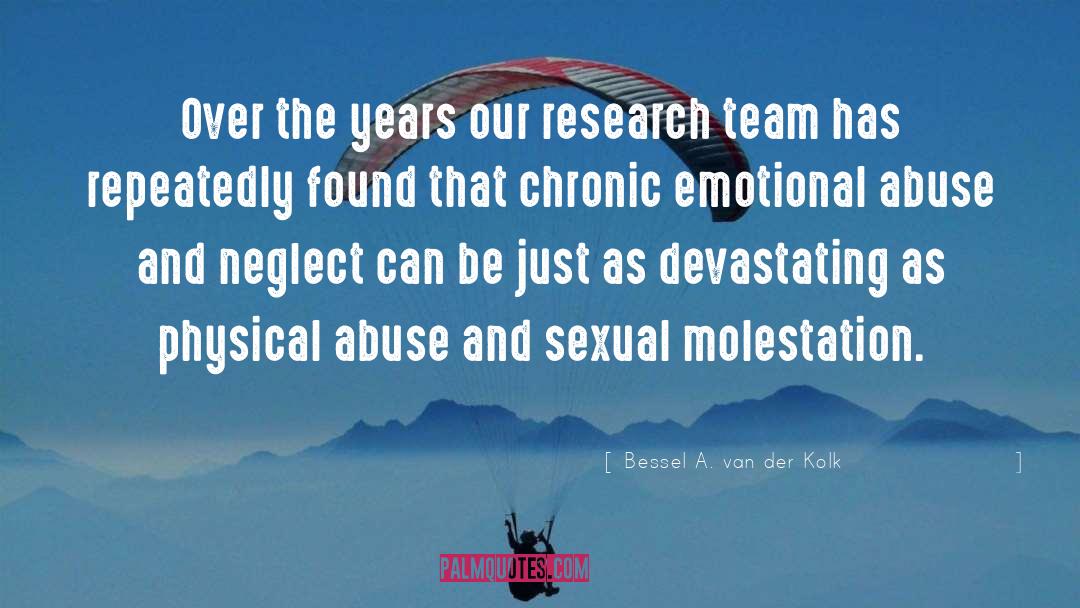
The traumatic event itself, however horrendous, had a beginning, a middle, and an end, but I now saw that flashbacks could be even worse. You never know when you will be assaulted by them again and you have no way of telling when they will stop.
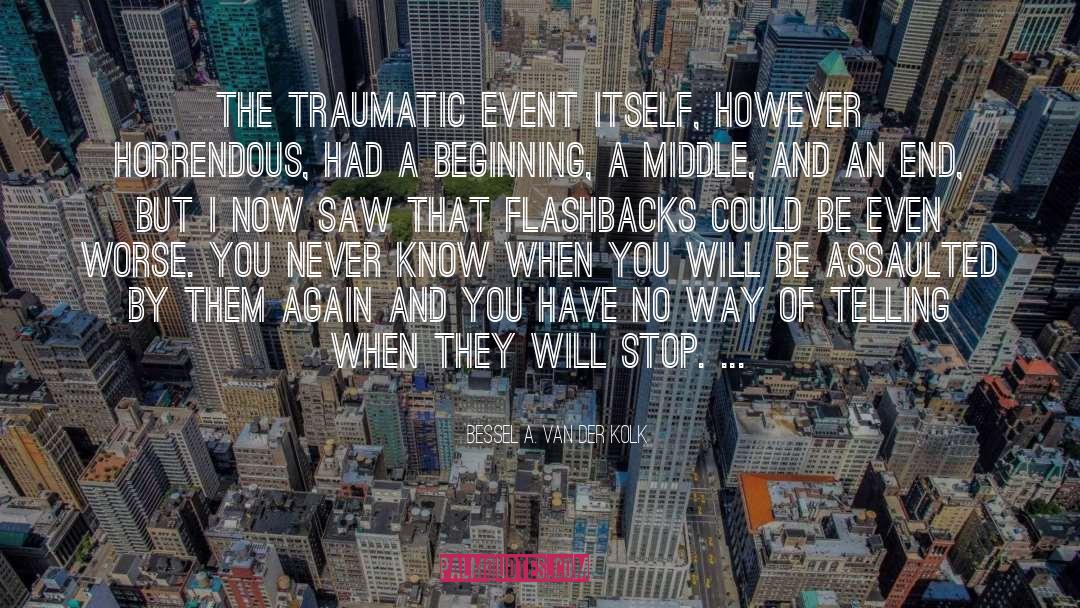
Research from these new disciplines has revealed that trauma produces actual physiological changes, including a recalibration of the brain's alarm system, an increase in stress hormone activity, and alterations in the system that filters relevant information from irrelevant. We now know that trauma compromises the brain area that communicates the physical, embodied feeling of being alive. These changes explain why traumatized individuals become hypervigilant to threat at the expense of spontaneously engaging in their day-to-day lives. They also help us understand why traumatized people so often keep repeating the same problems and have such trouble learning from experience. We now know that their behaviors are not the result of moral failings or signs of lack of willpower or bad character - they are caused by actual changes in the brain. This
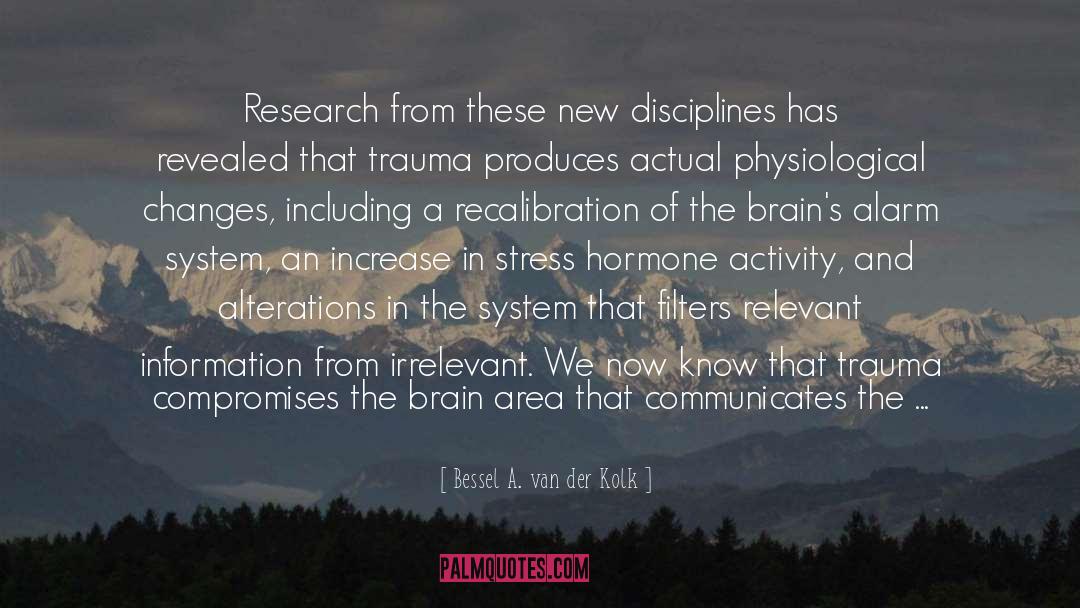
No doctor can write a prescription for friendship and love: These are complex and hard-earned capacities. You don't need a history of trauma to feel self-conscious and even panicked at a party with strangers - but trauma can turn the whole world into a gathering of aliens.
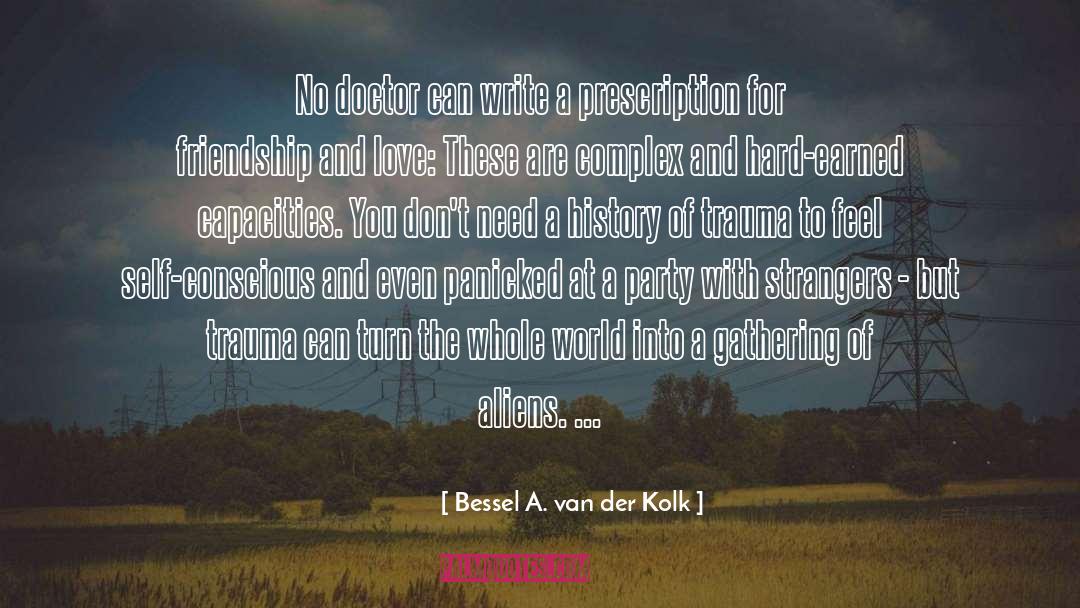
In contrast, children with histories of abuse and neglect learn that their terror, pleading, and crying do not register with their caregiver. Nothing they can do or say stops the beating or brings attention and help. In effect they're being conditioned to give up when they face challenges later in life. BECOMING
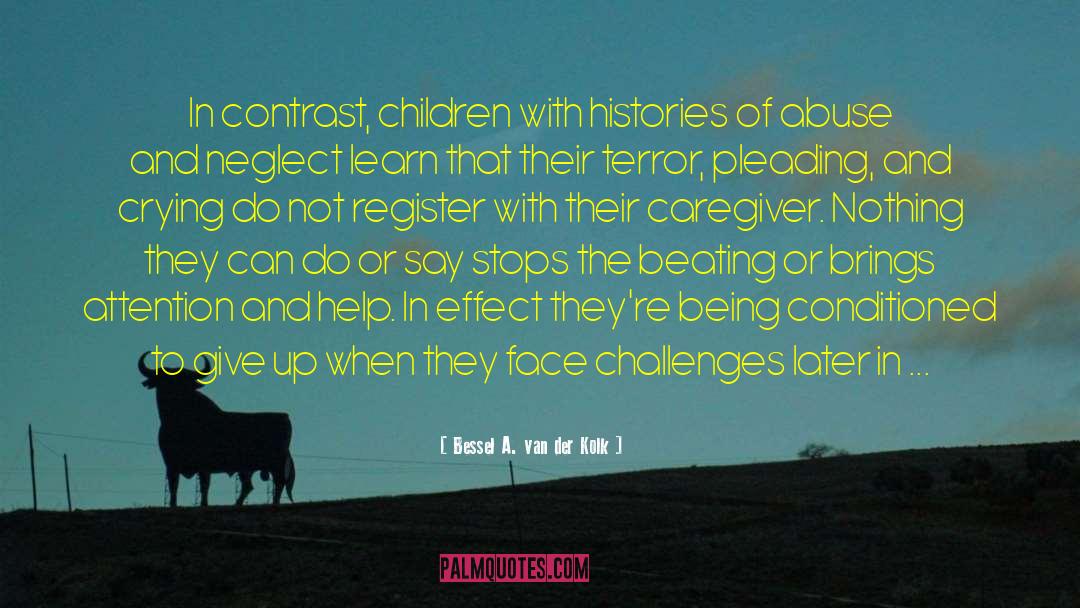
People who suffer from alexithymia tend to feel physically uncomfortable but cannot describe exactly what the problem is. As a result they often have multiple vague and distressing physical complaints that doctors can't diagnose. In addition, they can't figure out for themselves what they're really feeling about any given situation or what makes them feel better or worse. This is the result of numbing, which keeps them from anticipating and responding to the ordinary demands of their bodies in quiet, mindful ways. If you are not aware of what your body needs, you can't take care of it. If you don't feel hunger, you can't nourish yourself. If you mistake anxiety for hunger, you may eat too much. And if you can't feel when you're satiated, you'll keep eating.

That morning I realized I would probably spend the rest of my professional life trying to unravel the mysteries of trauma. How do horrific experiences cause people to become hopelessly stuck in the past? What happens in people's minds and brains that keeps them frozen, trapped in a place they desperately wish to escape? Why
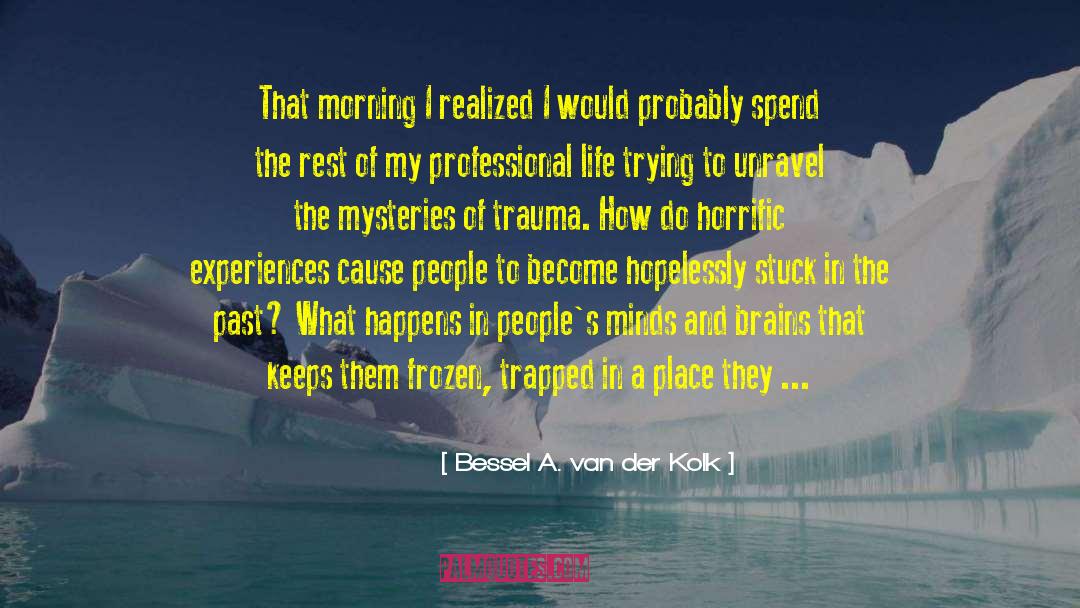
Unlike other forms of psychological disorders, the core issue in trauma is reality.
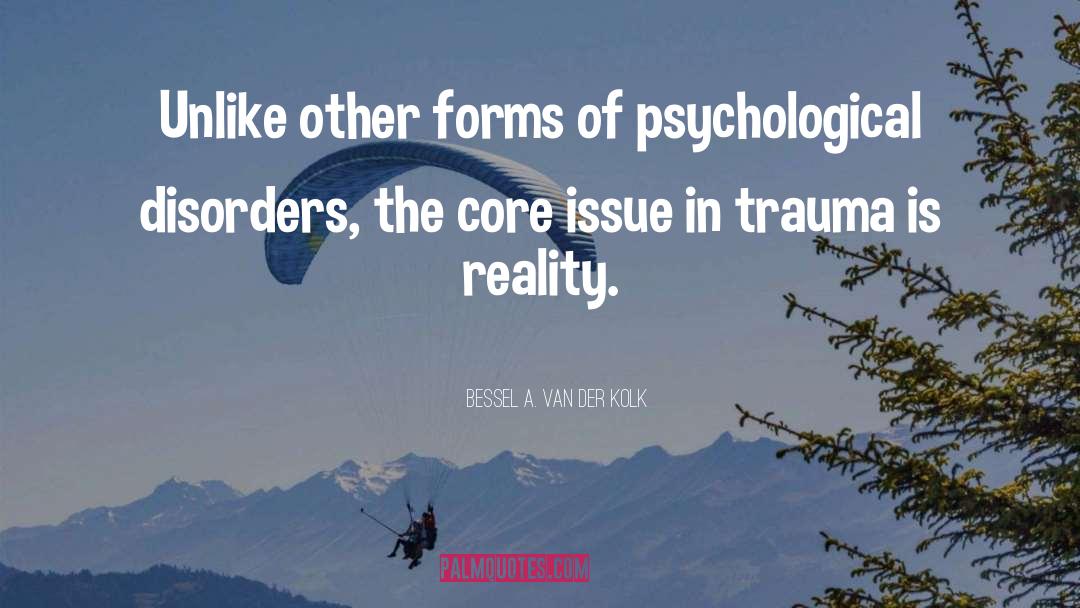
Under normal conditions people react to a threat with a temporary increase in their stress hormones. As soon as the threat is over, the hormones dissipate and the body returns to normal. The stress hormones of traumatized people, in contrast, take much longer to return to baseline and spike quickly and disproportionately in response to mildly stressful stimuli. The insidious effects of constantly elevated stress hormones include memory and attention problems, irritability, and sleep disorders. They also contribute to many long-term health issues, depending on which body system is most vulnerable in a particular individual.
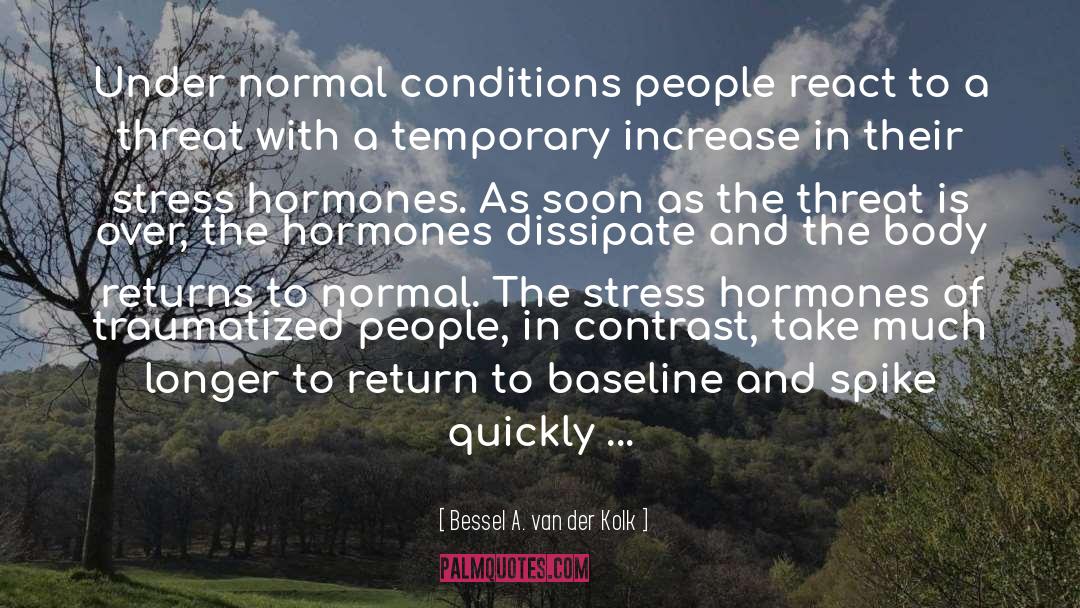
Mindfulness not only makes it possible to survey our internal landscape with compassion and curiosity but can also actively steer us in the right direction for self-care.
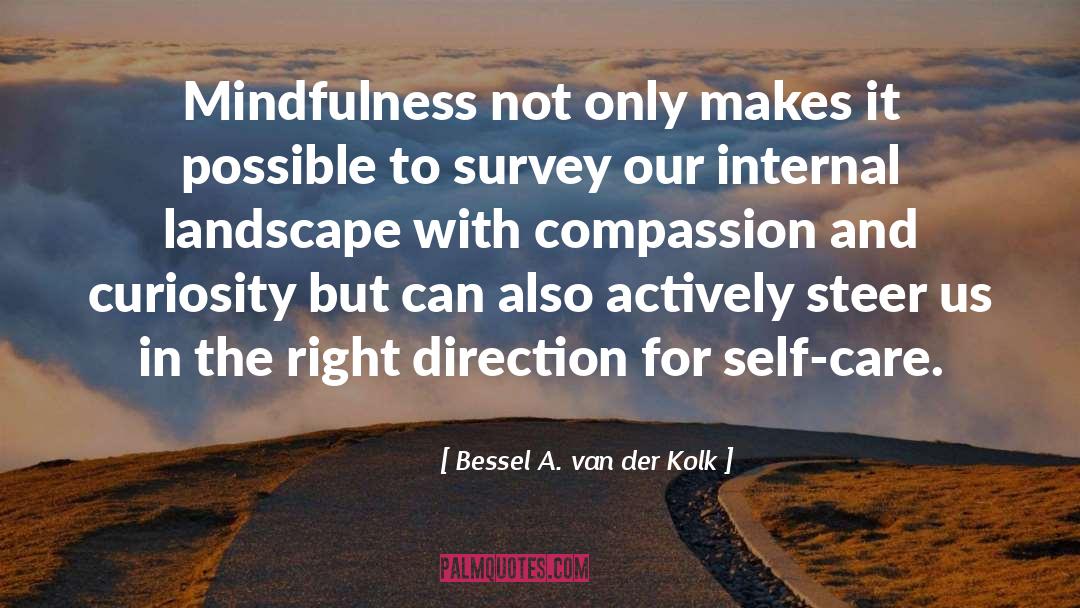
As long as a memory is inaccessible, the mind is unable to change it. But as soon as a story starts being told, particularly if it is told repeatedly, it changes – the act of telling itself changes the tale. The mind cannot help but make meaning out of what it knows, and the meaning we make of our lives changes how and what we remember.
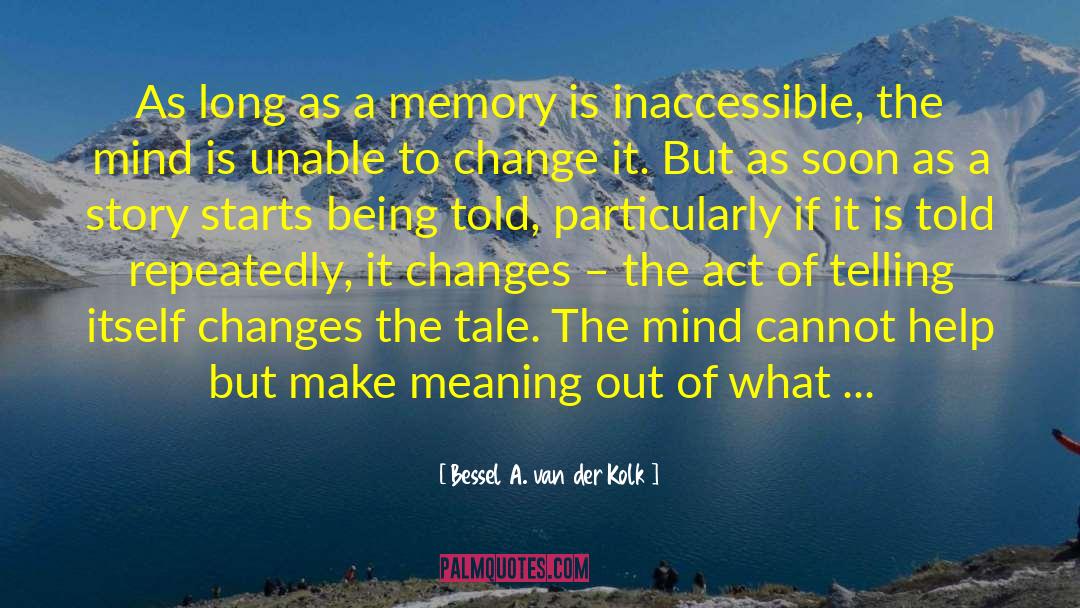
How many mental health problems, from drug addiction to self-injurious behavior, start as attempts to cope with the unbearable physical pain of our emotions? If Darwin was right, the solution requires finding ways to help people alter the inner sensory landscape of their bodies. Until recently, this bidirectional communication between body and mind was largely ignored by Western science, even as it had long been central to traditional healing practices in many other parts of the world, notably in India and China. Today it is transforming our understanding of trauma and recovery.
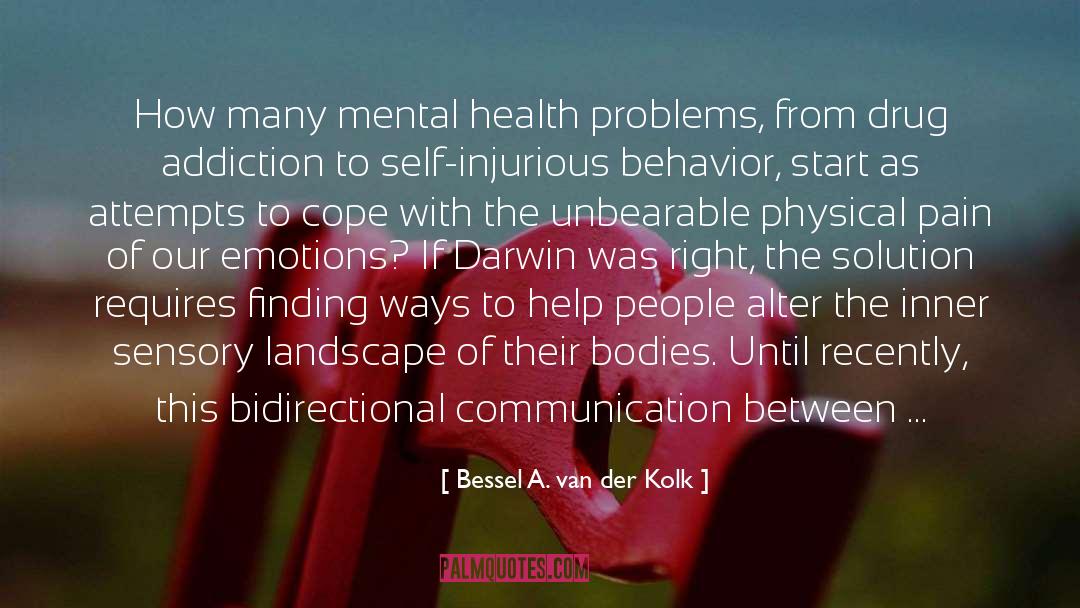
As I often tell my students, the two most important phrases in therapy, as in yoga, are "Notice that" and "What happens next?" Once you start approaching your body with curiosity rather than with fear, everything shifts.
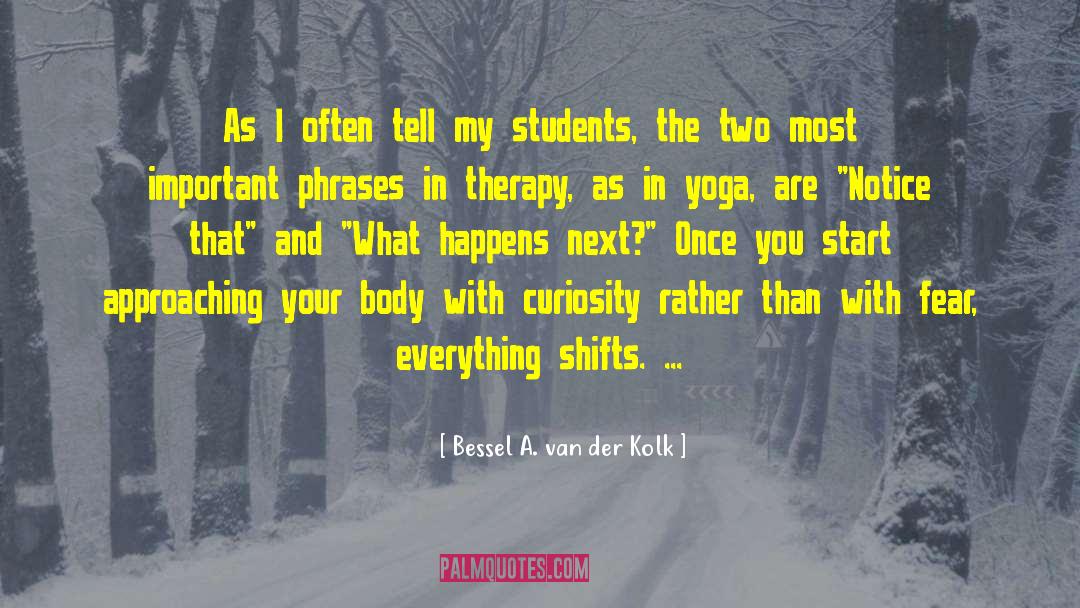
While reliving trauma is dramatic, frightening, and potentially self-destructive, over time a lack of presence can be even more damaging. This is a particular problem with traumatized children. The acting-out kids tend to get attention; the blanked-out ones don't bother anybody and are left to lose their future bit by bit.
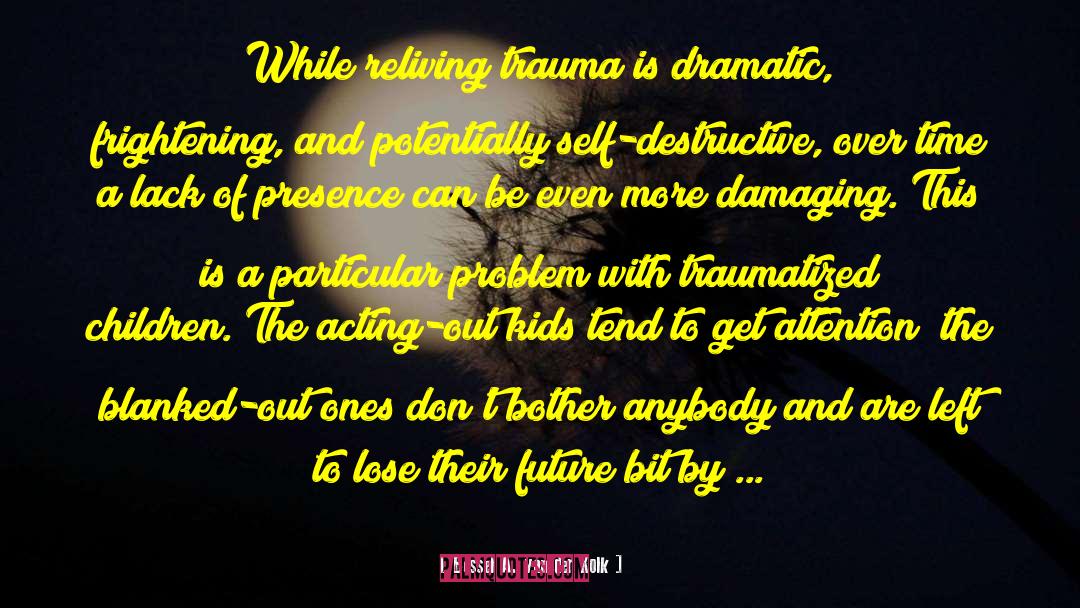
Isolating oneself into a narrowly defined victim group promotes a view of others as irrelevant at best and dangerous at worst, which eventually only leads to further alienation. Gangs, extremist political parties, and religious cults may provide solace, but they rarely foster the mental flexibility needed to be fully open to what life has to offer and as such cannot liberate their members from their traumas. Well-functioning people are able to accept individual differences and acknowledge the humanity of others.
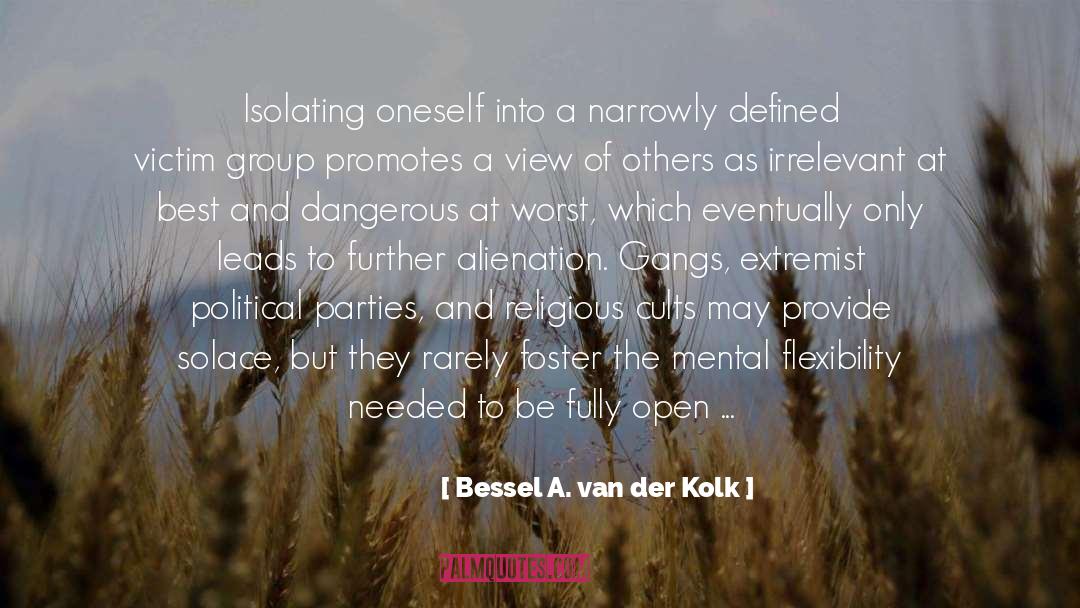
French psychiatrist Pierre Janet: "Every life is a piece of art, put together with all means available." As
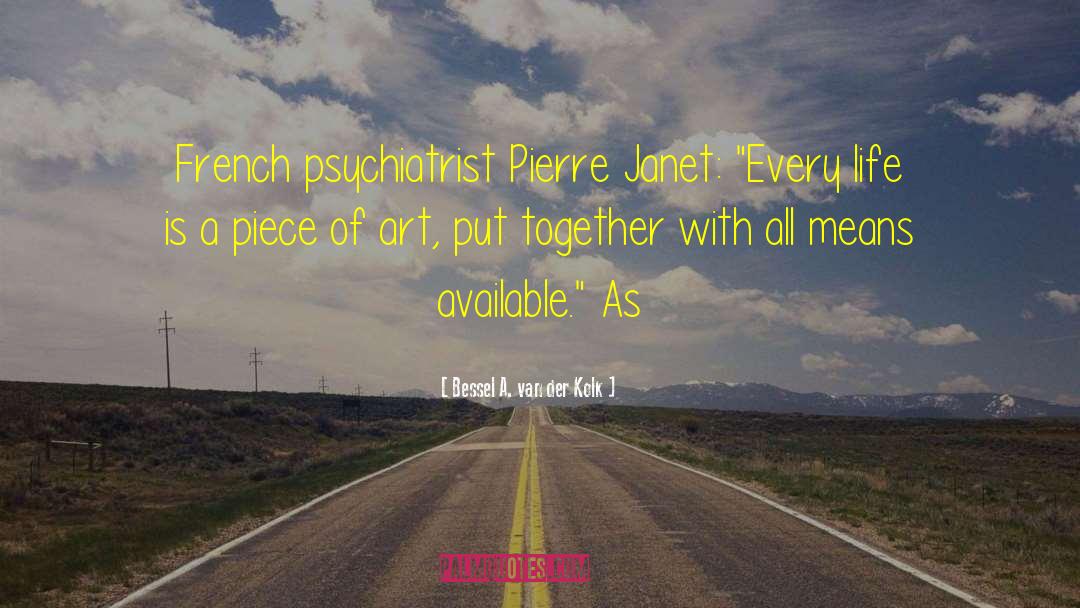
Without imagination there is no hope, no chance to envision a better future, no place to go, no goal to reach.

In the past two decades it has become widely recognized that when adults or children are too skittish or shut down to derive comfort from human beings, relationships with other mammals can help. Dogs and horses and even dolphins offer less complicated companionship while providing the necessary sense of safety. Dogs and horses, in particular, are now extensively used to treat some groups of trauma patients.10
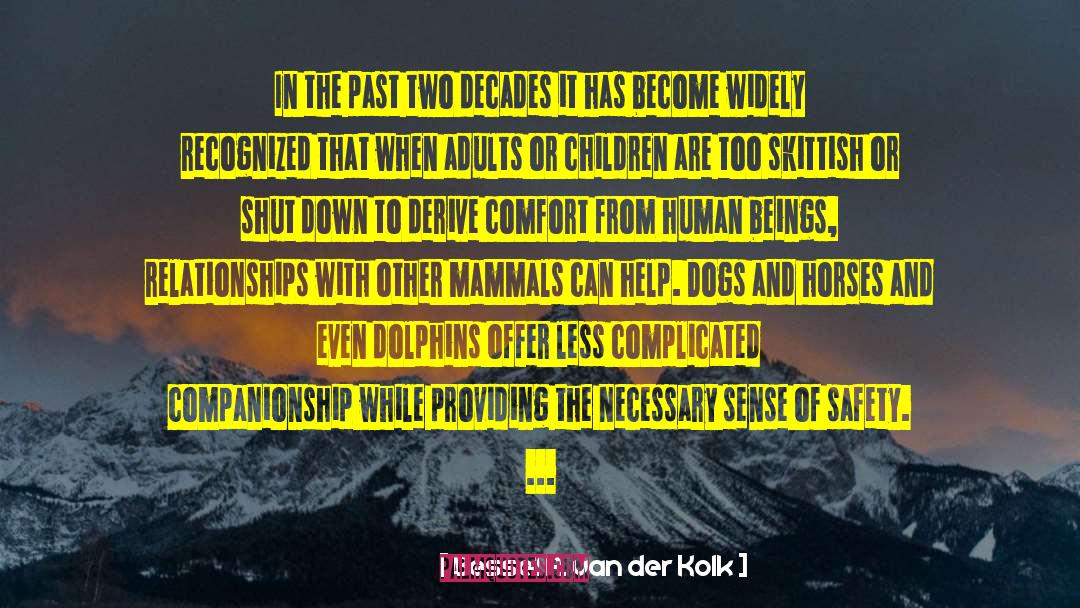
The greatest sources of our suffering are the lies we tell ourselves.
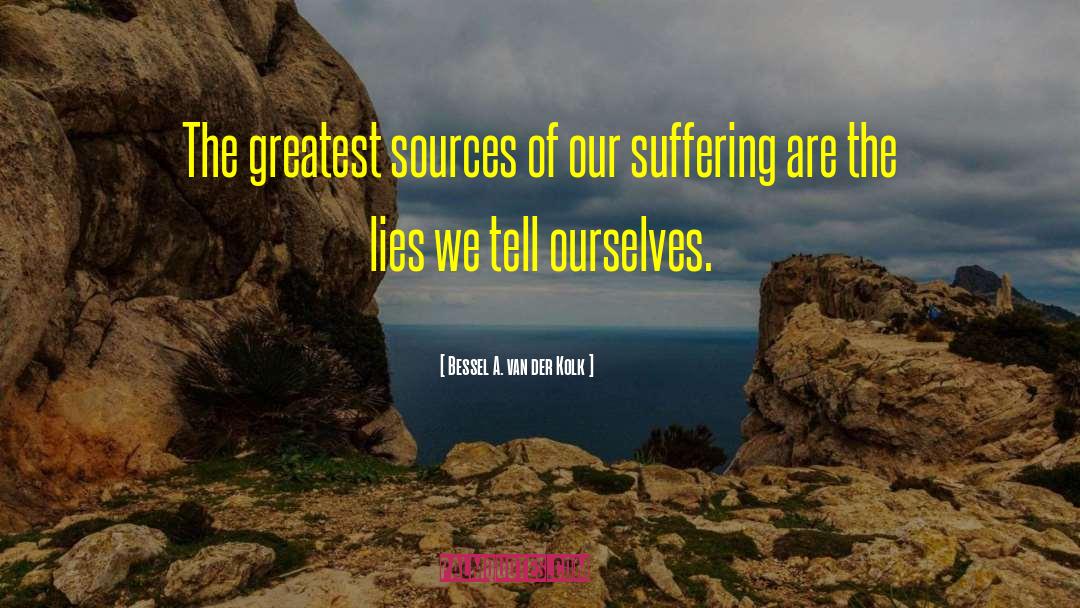
As the ACE study has shown, child abuse and neglect is the single most preventable cause of mental illness, the single most common cause of drug and alcohol abuse, and a significant contributor to leading causes of death such as diabetes, heart disease, cancer, stroke, and suicide.
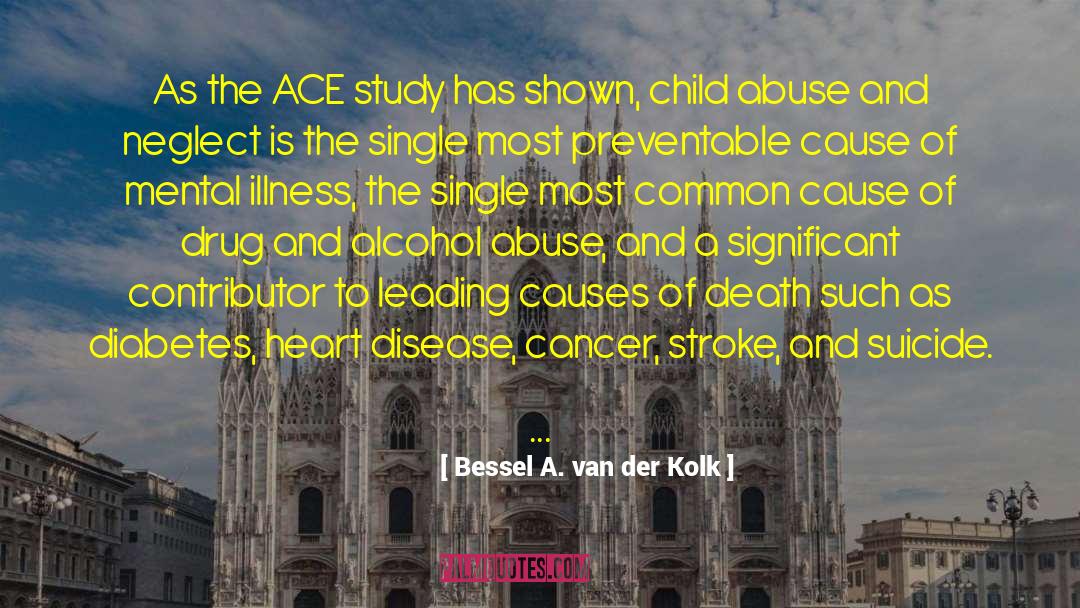
One thing is certain: Yelling at someone who is already out of control can only lead to further dysregulation. Just as your dog cowers if you shout and wags his tail when you speak in a high singsong, we humans respond to harsh voices with fear, anger, or shutdown and to playful tones by opening up and relaxing. We simply cannot help but respond to these indicators of safety or danger.

In my practice I use neurofeedback primarily to help with the hyperarousal, confusion, and concentration problems of people who suffer from developmental trauma. However, it has also shown good results for numerous issues and conditions that go beyond the scope of this book, including relieving tension headaches, improving cognitive functioning following a traumatic brain injury, reducing anxiety and panic attacks, learning to deepen meditation states, treating autism, improving seizure control, self-regulation in mood disorders, and more.
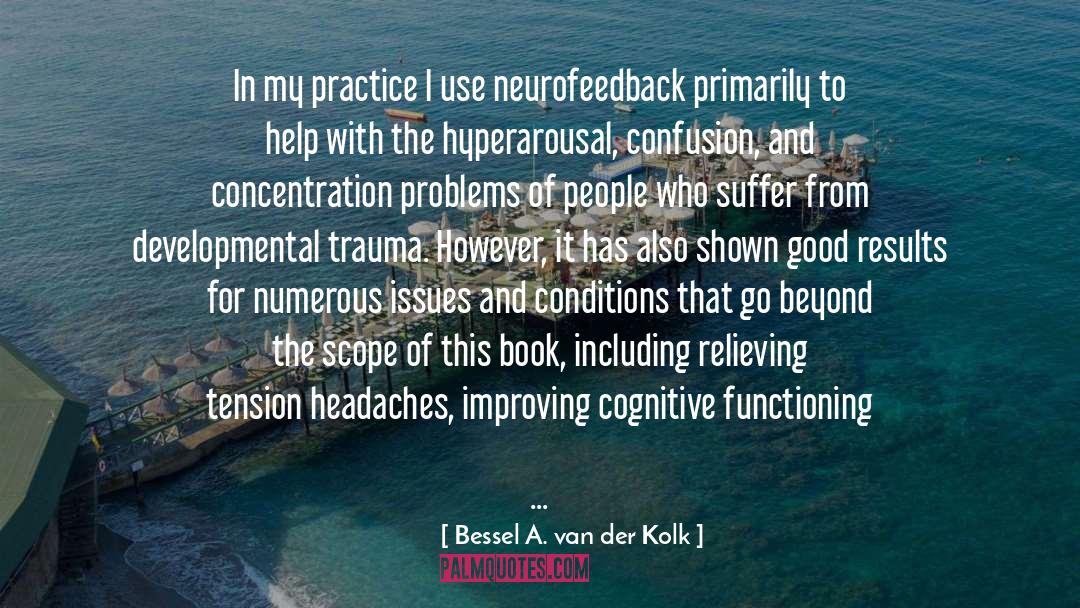
Our brains are built to help us function as members of a tribe.
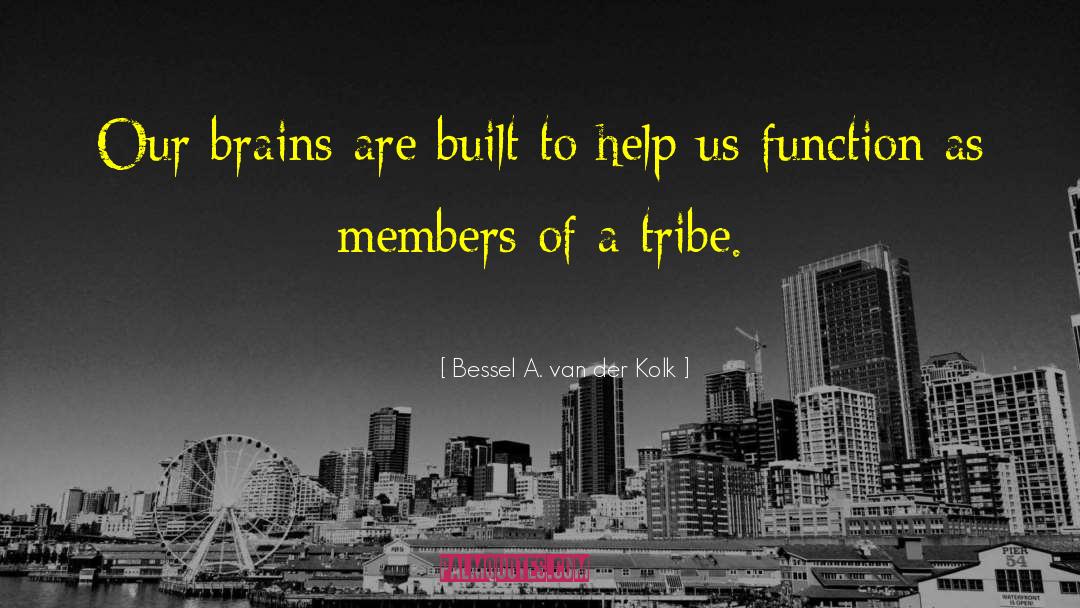
We have learned that trauma is not just an event that took place sometime in the past; it is also the imprint left by that experience on mind, brain, and body. This imprint has ongoing consequences for how the human organism manages to survive in the present. Trauma results in a fundamental reorganization of the way mind and brain manage perceptions. It changes not only how we think and what we think about, but also our very capacity to think.

Eighty two percent of the traumatized children seen in the National Child Traumatic Stress Network do not meet diagnostic criteria for PTSD.15 Because they often are shut down, suspicious, or aggressive they now receive pseudoscientific diagnoses such as "oppositional defiant disorder," meaning "This kid hates my guts and won't do anything I tell him to do," or "disruptive mood dysregulation disorder," meaning he has temper tantrums. Having as many problems as they do, these kids accumulate numerous diagnoses over time. Before they reach their twenties, many patients have been given four, five, six, or more of these impressive but meaningless labels. If they receive treatment at all, they get whatever is being promulgated as the method of management du jour: medications, behavioral modification, or exposure therapy. These rarely work and often cause more damage.
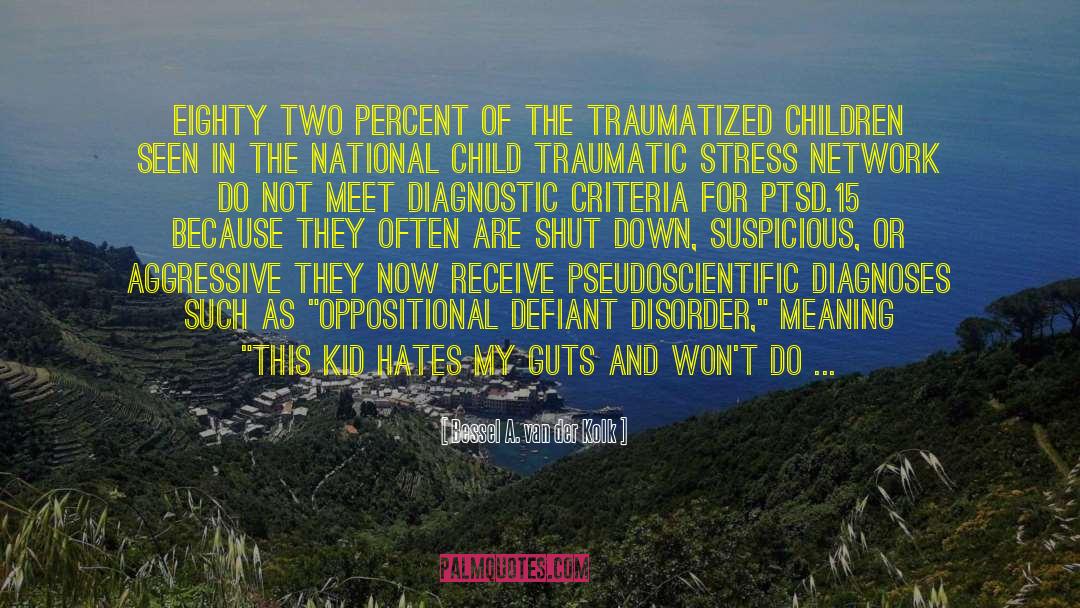
If a mother cannot meet her baby's impulses and needs, [quoting Donald Winnicott] 'the baby learns to become the mother's idea of what the baby is.' Having to discount its inner sensations, and trying to adjust it its caregiver's needs, means the child perceives that 'something is wrong' with the way it is. Children who lack physical attunement are vulnerable to shutting down the direct feedback from their bodies, the seat of pleasure, purpose, and direction.
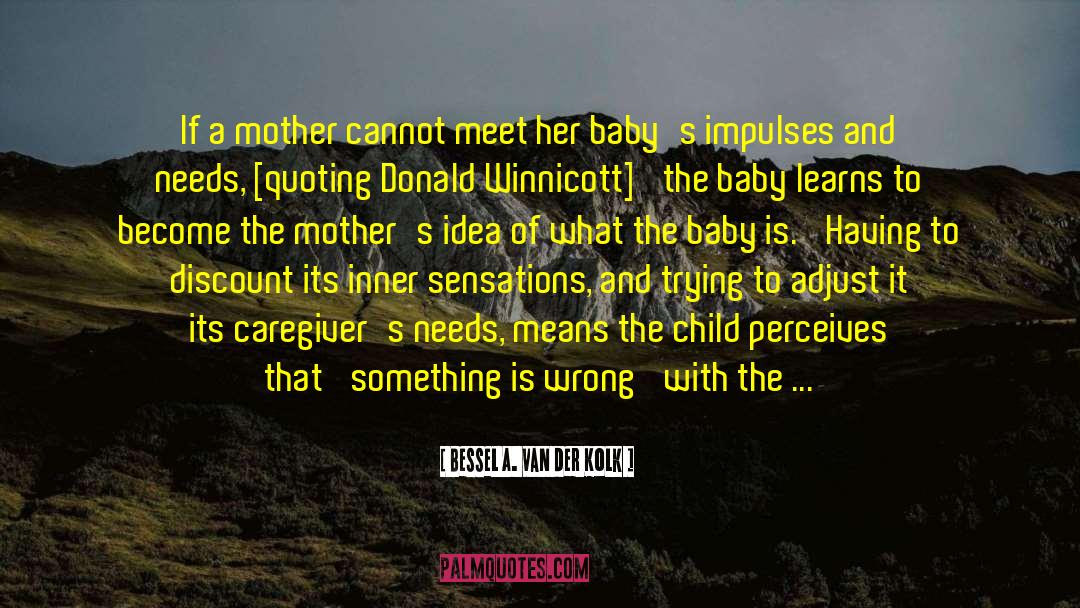
When you're sick, who does the shopping or takes you to the doctor? Who do you talk to when you are upset?" In other words, who provides you with emotional and practical support? Some patients gave us surprising answers: "my dog" or "my therapist" – or "nobody".

As long as we feel safely held in the hearts and minds of the people who love us, we will climb mountains and cross deserts and stay up all night to finish projects.
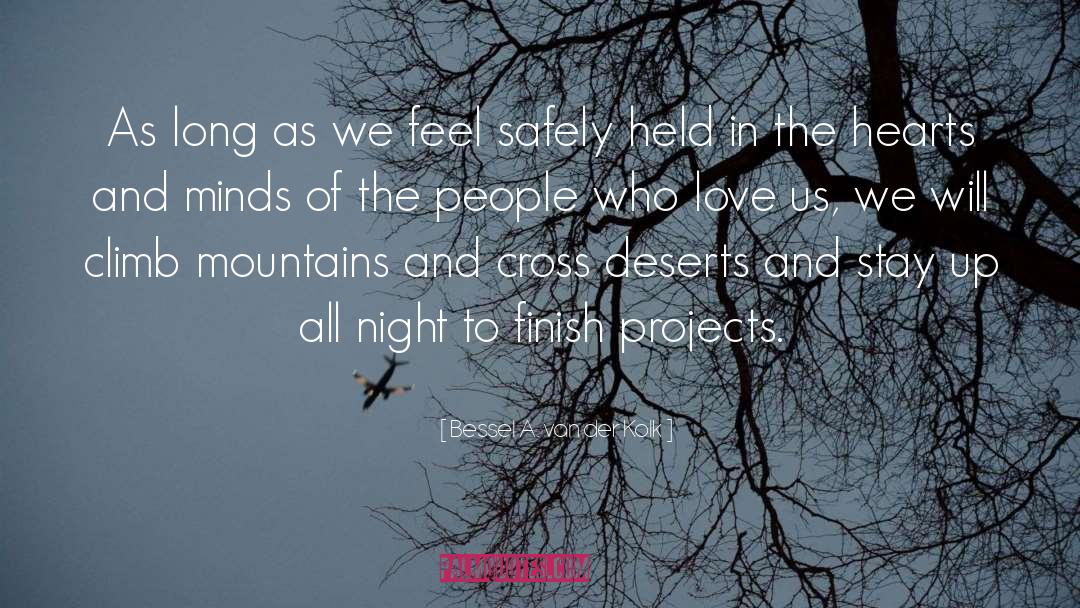
Many traumatized individuals are too hypervigilant to enjoy the ordinary pleasures that life has to offer, while other are too numb to absorb new experiences – or to be alert to signs of real danger. When the smoke detectors of the brain malfunction, people no longer run when they should be trying to escape or fight back when they should be defending themselves.
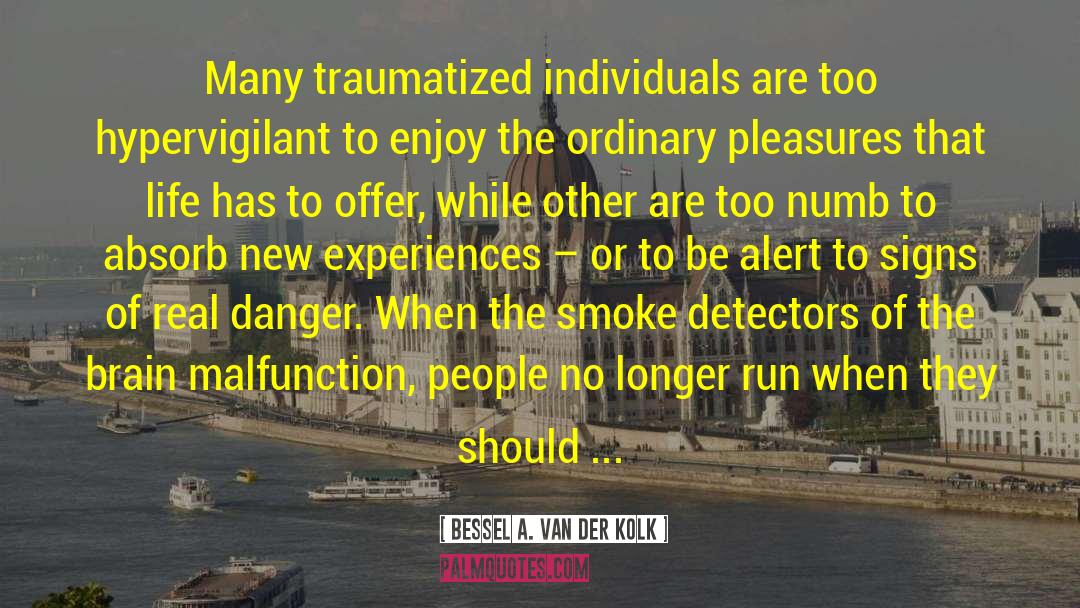
It takes tremendous energy to keep functioning while carrying the memory of terror, and the shame of utter weakness and vulnerability. While
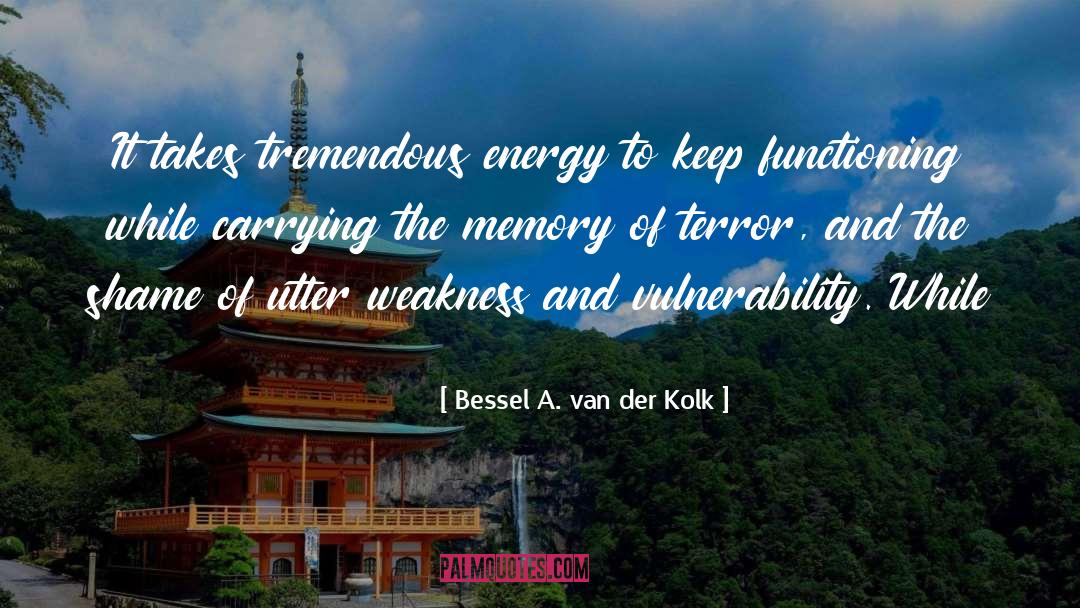
Self-regulation can be taught to many kids who cycle between frantic activity and immobility. In addition to reading, writing, and arithmetic, all kids need to learn self-awareness, self-regulation, and communication as part of their core curriculum. Just as we teach history and geography, we need to teach children how their brains and bodies work. For adults and children alike, being in control of ourselves requires becoming familiar with our inner world and accurately identifying what scares, upsets, or delights us.
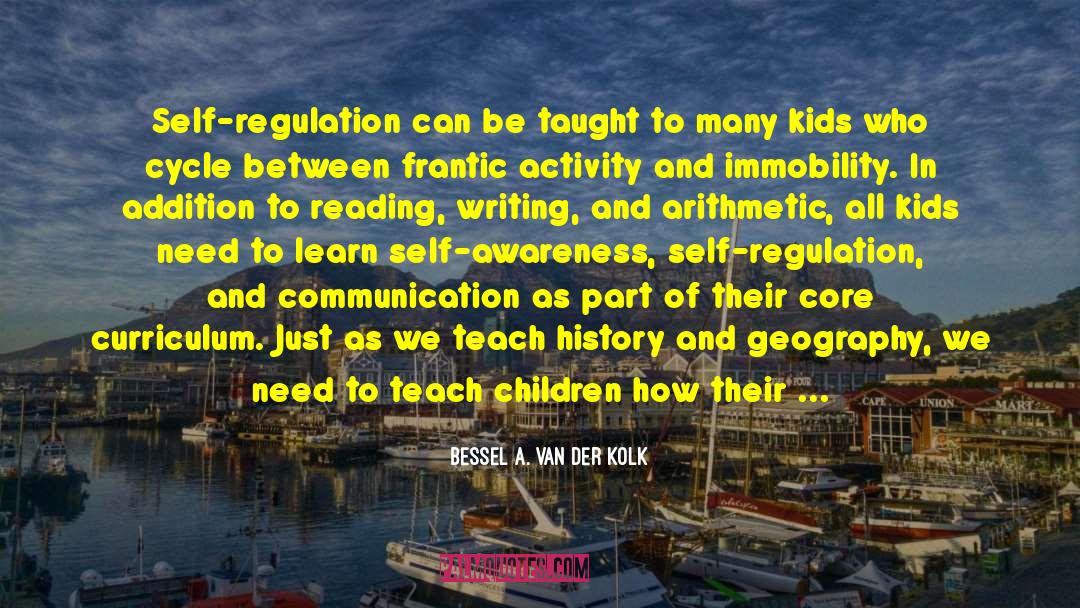
When people are unable to integrate their traumatic memories, they seem to lose their capacity to assimilate new experiences as well. It is as if their personality stops at a certain points and cannot enlarge any more by the addition or assimilation of new elements. Unless they become aware of the split off elements and integrate them into a story that had happened in the past but was now over, they would experience a slow decline in their personal and professional functioning.
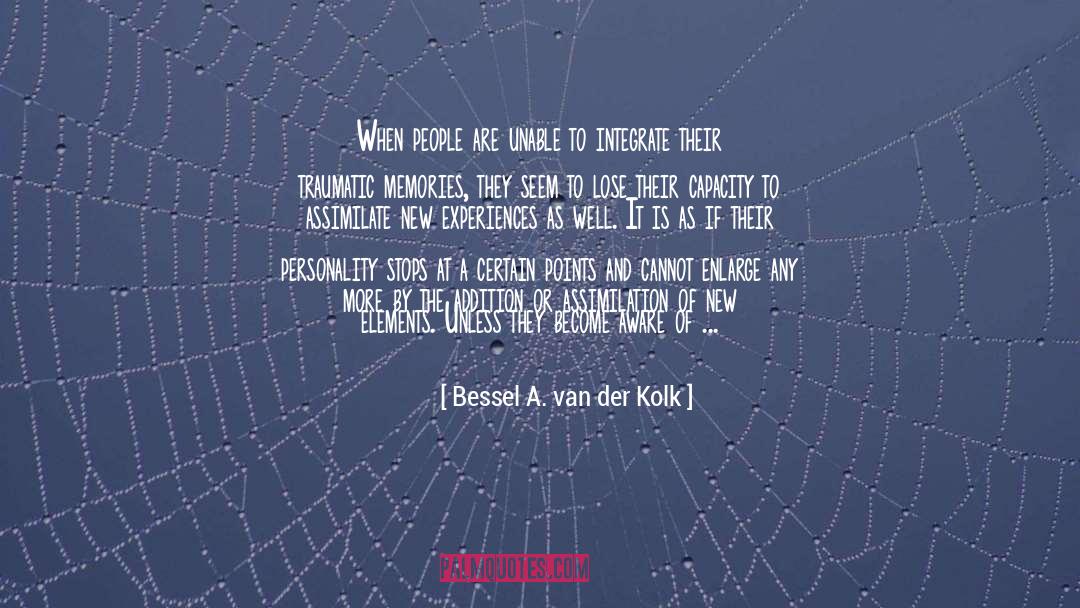
Being able to feel safe with other people is probably the single most important aspect of mental health; safe connections are fundamental to meaningful and satisfying lives.
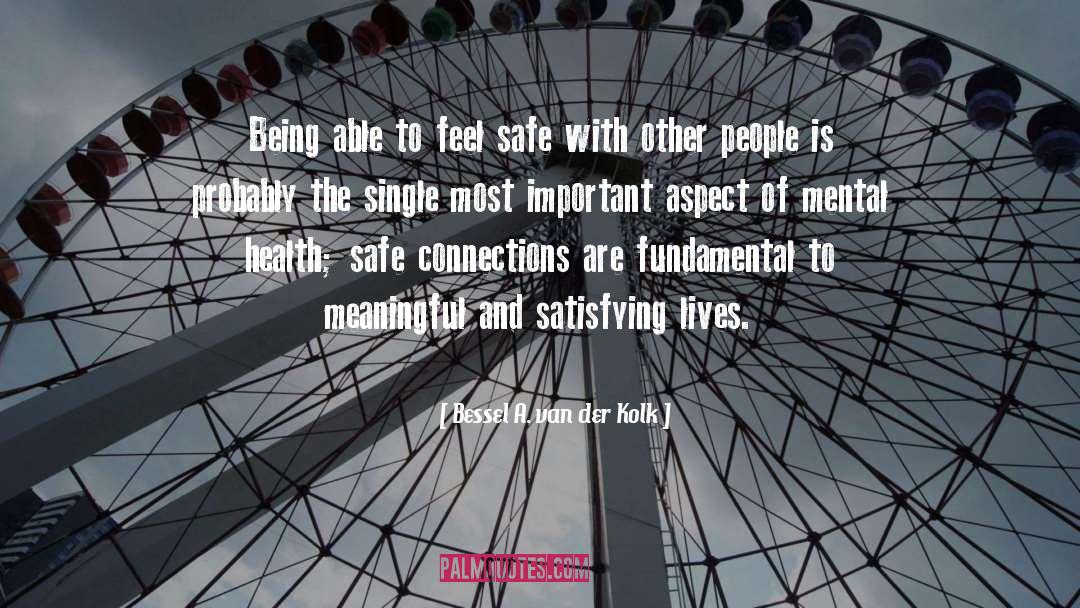
We don't really want to know what soldiers go through in combat. We do not really want to know how many children are being molested and abused in our own society or how many couples - almost a third, as it turns out - engage in violence at some point during their relationship. We want to think of families as safe havens in a heartless world and of our own country as populated by enlightened, civilized people. We prefer to believe that cruelty occurs only in faraway places like Darfur or the Congo. It is hard enough for observers to bear witness to pain. Is it any wonder, then, that the traumatized individuals themselves cannot tolerate remembering it and that they often resort to using drugs, alcohol, or self-mutilation to block out their unbearable knowledge?
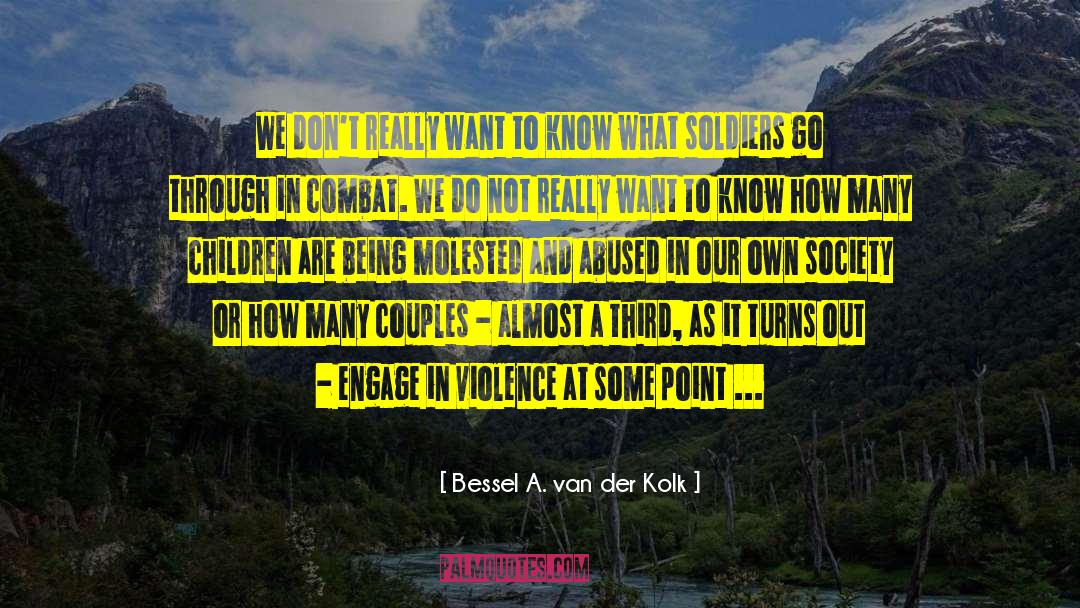
Semrad taught us that most human suffering is related to love and loss and that the job of therapists is to help people "acknowledge, experience, and bear" the reality of life - with all its pleasures and heartbreak. "The greatest sources of our suffering are the lies we tell ourselves," he'd say, urging us to be honest with ourselves about every facet of our experience. He often said that people can never get better without knowing what they know and feeling what they feel. I
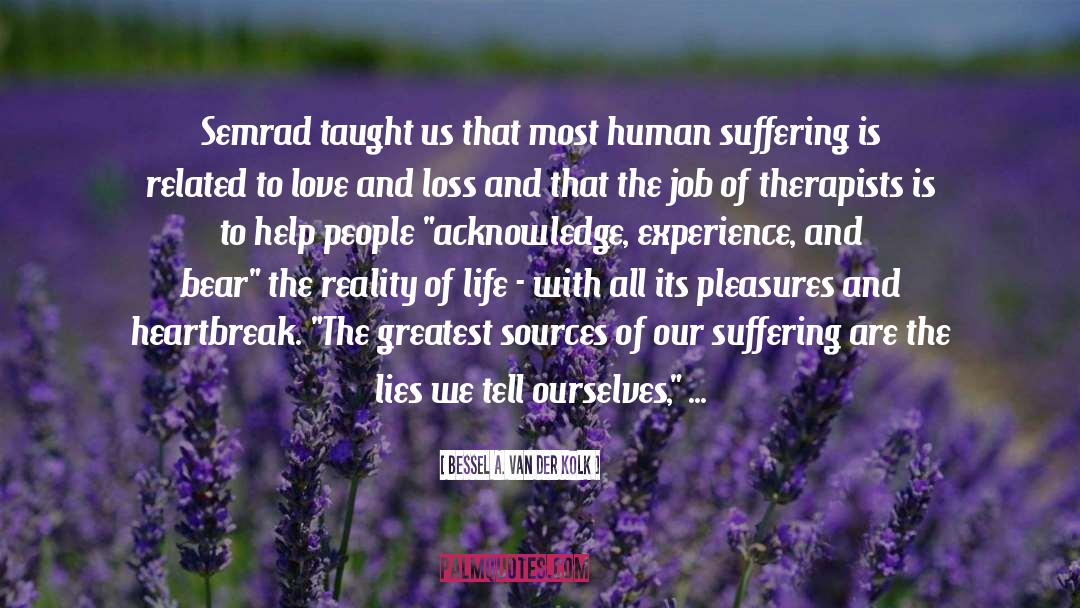
If you criticize others, they don't dare to hurt you. If you are perfect, nobody can criticize you.
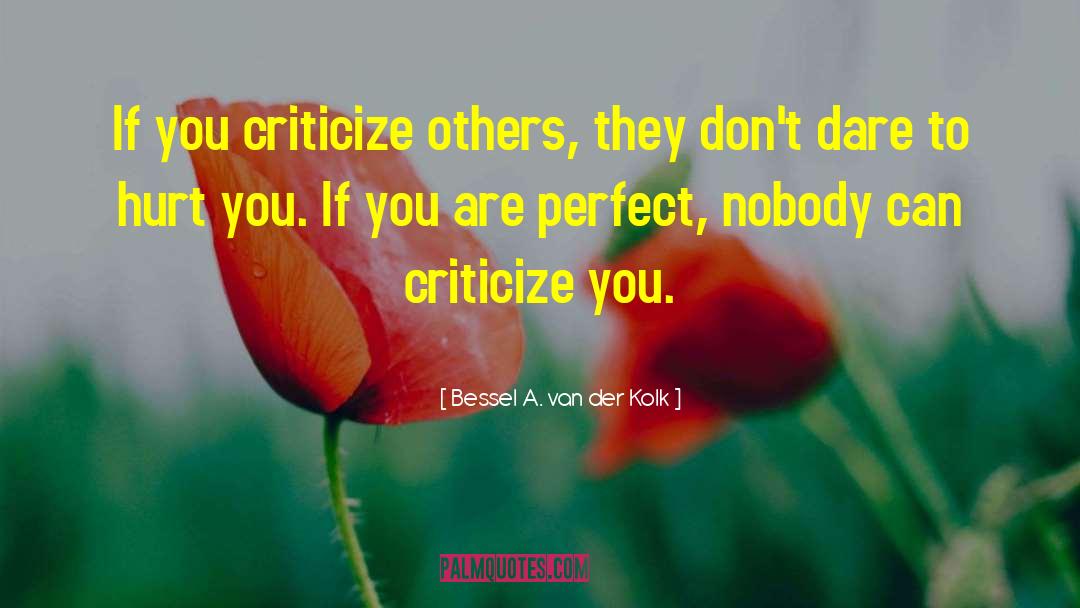
Knowing what we feel is the first step to knowing why we feel that way. If
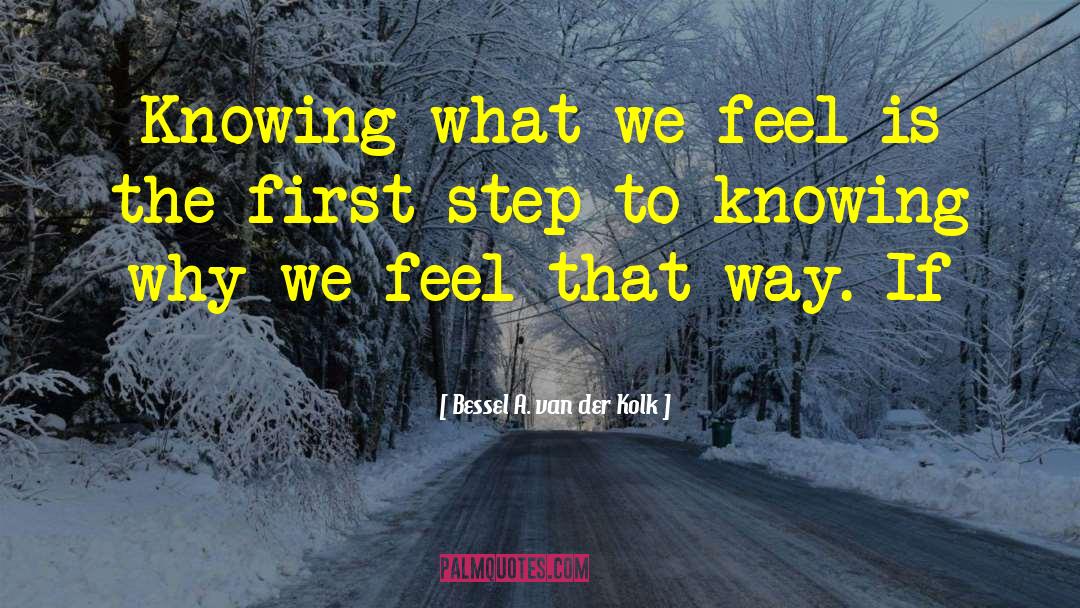
In contrast, EMDR, as well as the treatments discussed in subsequent chapters - internal family systems, yoga, neurofeedback, psychomotor therapy, and theater - focus not only on regulating the intense memories activated by trauma but also on restoring a sense of agency, engagement, and commitment through ownership of body and mind.
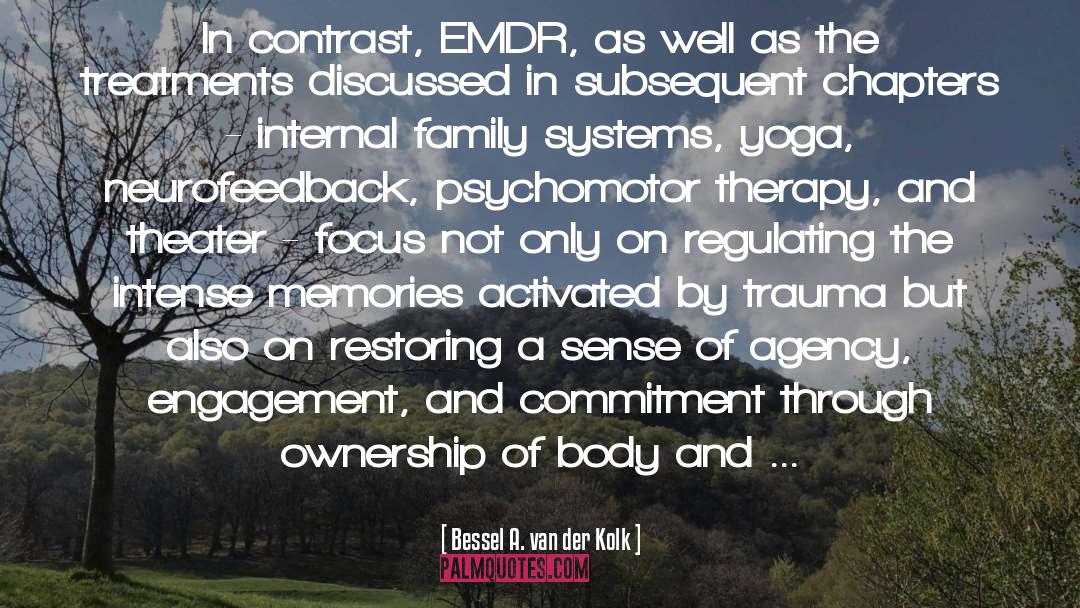
I have met countless patients who told me that they "are" bipolar or borderline or that they "have" PTSD, as if they had been sentenced to remain in an underground dungeon for the rest of their lives, like the Count of Monte Cristo. None of these diagnoses takes into account the unusual talents that many of our patients develop or the creative energies they have mustered to survive.
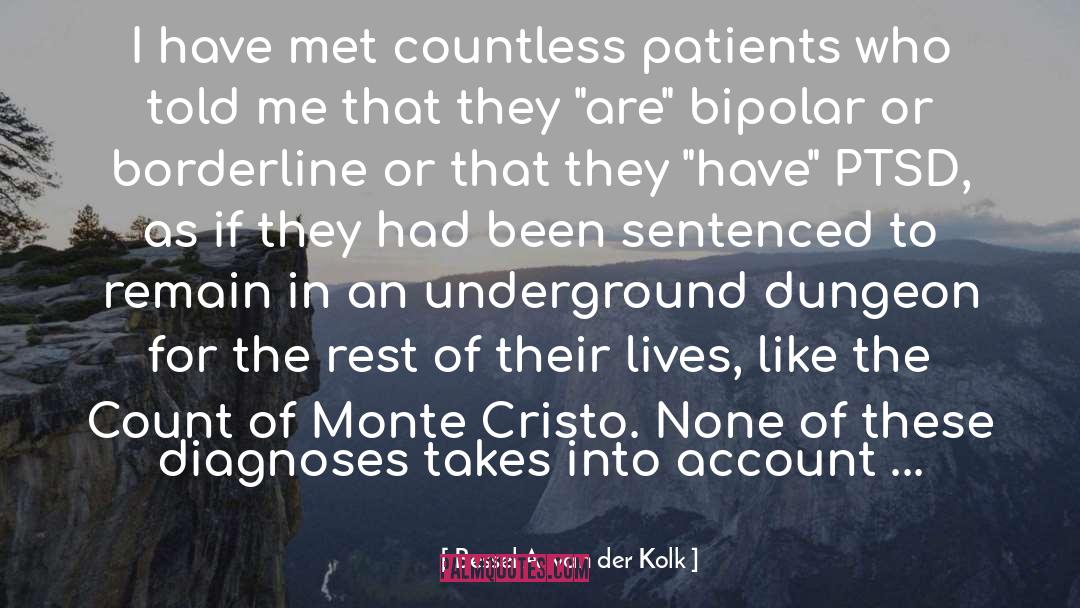
This was puzzling, as the standard textbook of psychiatry at the time stated that incest was extremely rare in the United States, occurring about once in every million women.8 Given that there were then only about one hundred million women living in the United States, I wondered how forty seven, almost half of them, had found their way to my office in the basement of the hospital. Furthermore, the textbook said, "There is little agreement about the role of father-daughter incest as a source of serious subsequent psychopathology." My patients with incest histories were hardly free of "subsequent psychopathology" - they were profoundly depressed, confused, and often engaged in bizarrely self-harmful behaviors, such as cutting themselves with razor blades. The textbook went on to practically endorse incest, explaining that "such incestuous activity diminishes the subject's chance of psychosis and allows for a better adjustment to the external world."9

Our increasing use of drugs to treat these conditions doesn't address the real issues: What are these patients trying to cope with? What are their internal or external resources? How do they calm themselves down? Do they have caring relationships with their bodies, and what do they do to cultivate a physical sense of power, vitality, and relaxation? Do they have dynamic interactions with other people? Who really knows them, loves them, and cares about them? Whom can they count on when they're scared, when their babies are ill, or when they are sick themselves? Are they members of a community, and do they play vital roles in the lives of the people around them? What specific skills do they need to focus, pay attention, and make choices? Do they have a sense of purpose? What are they good at? How can we help them feel in charge of their lives?
